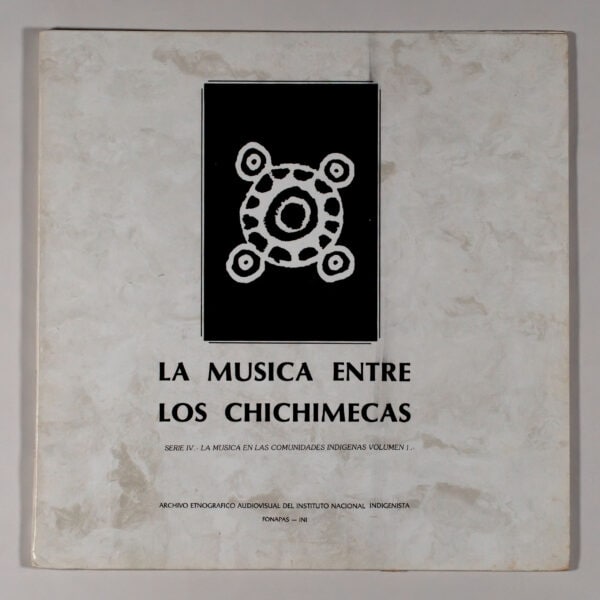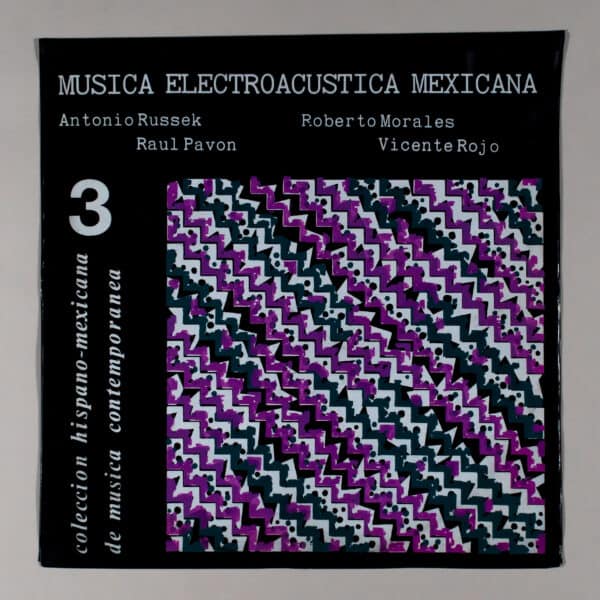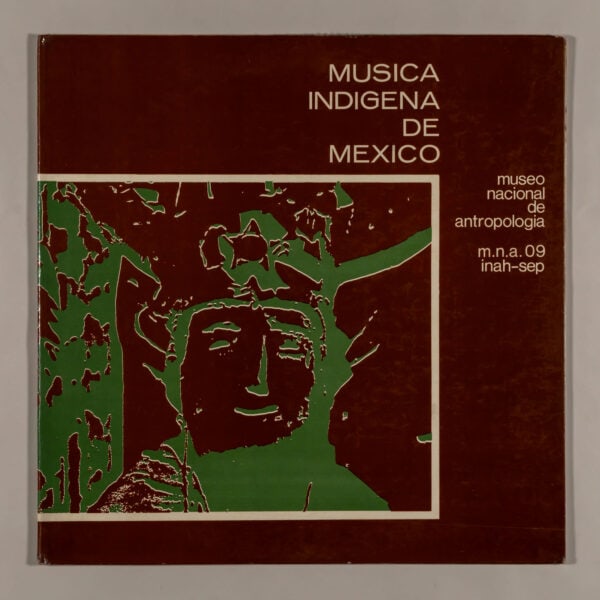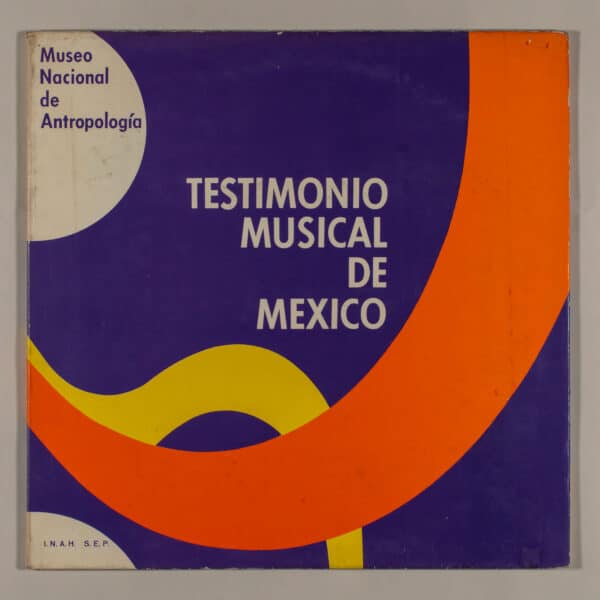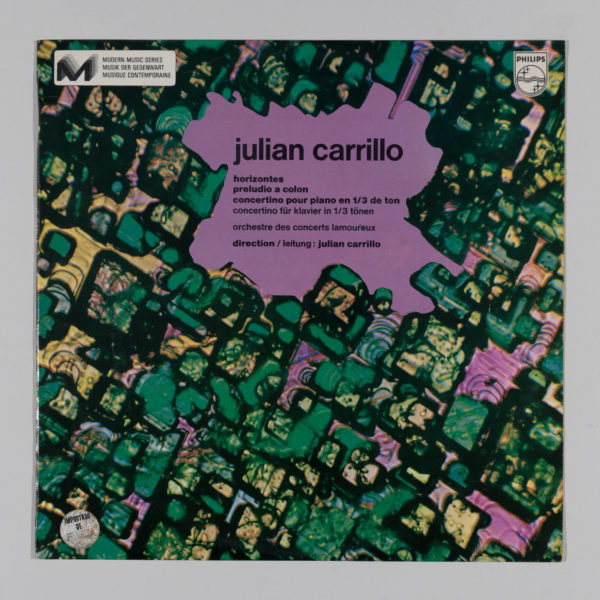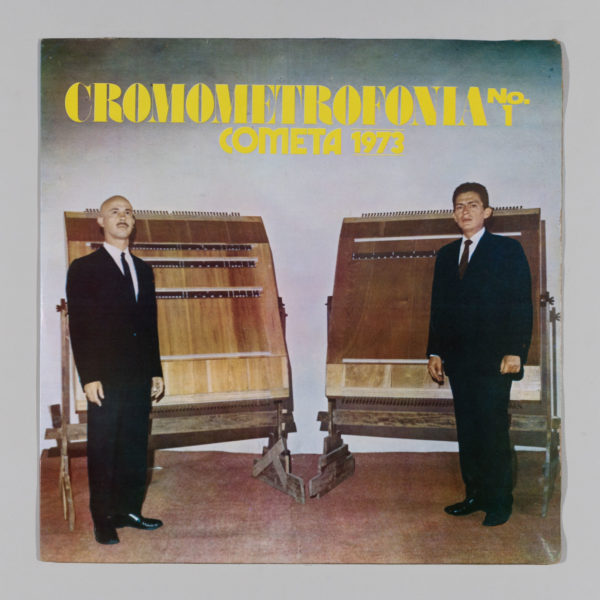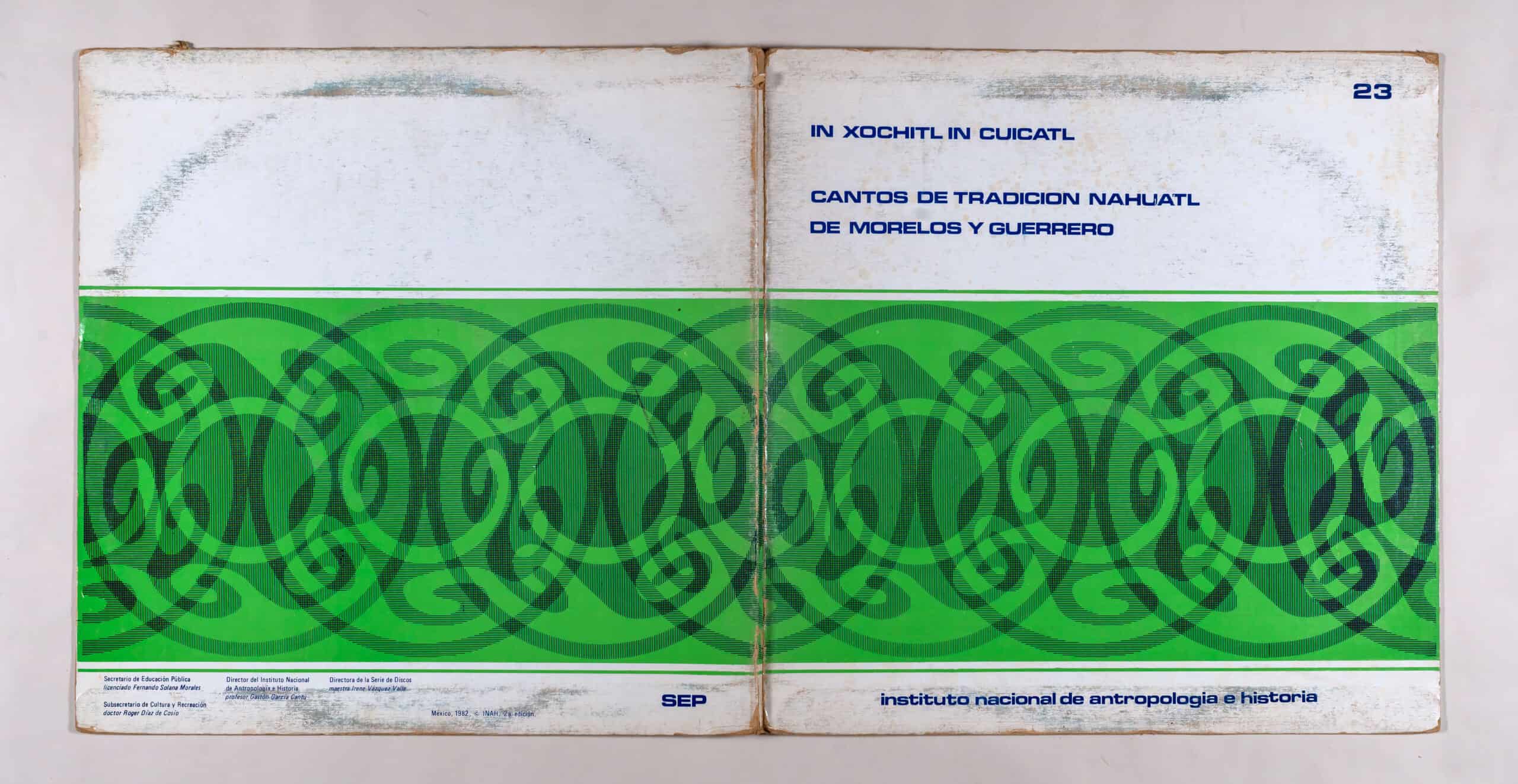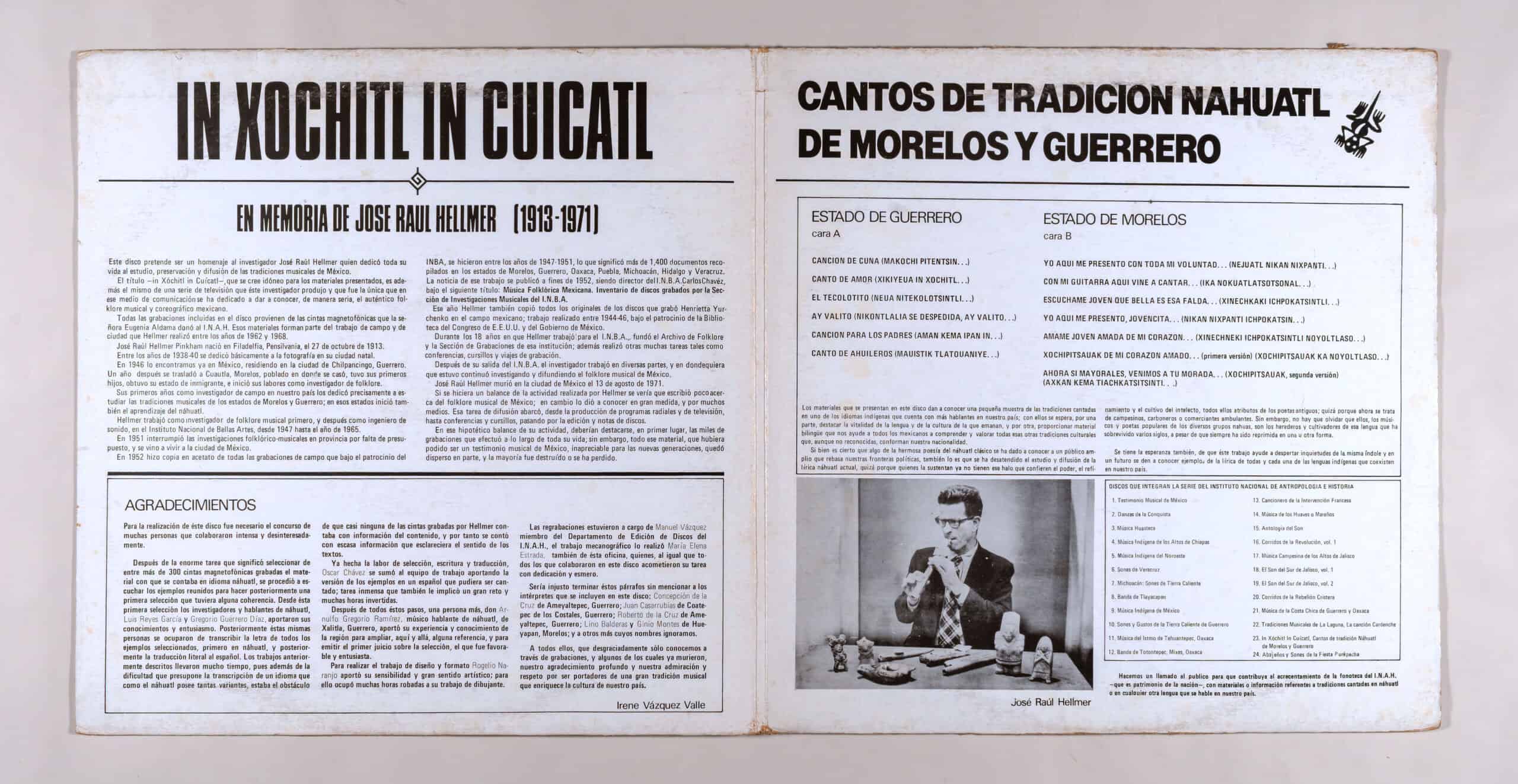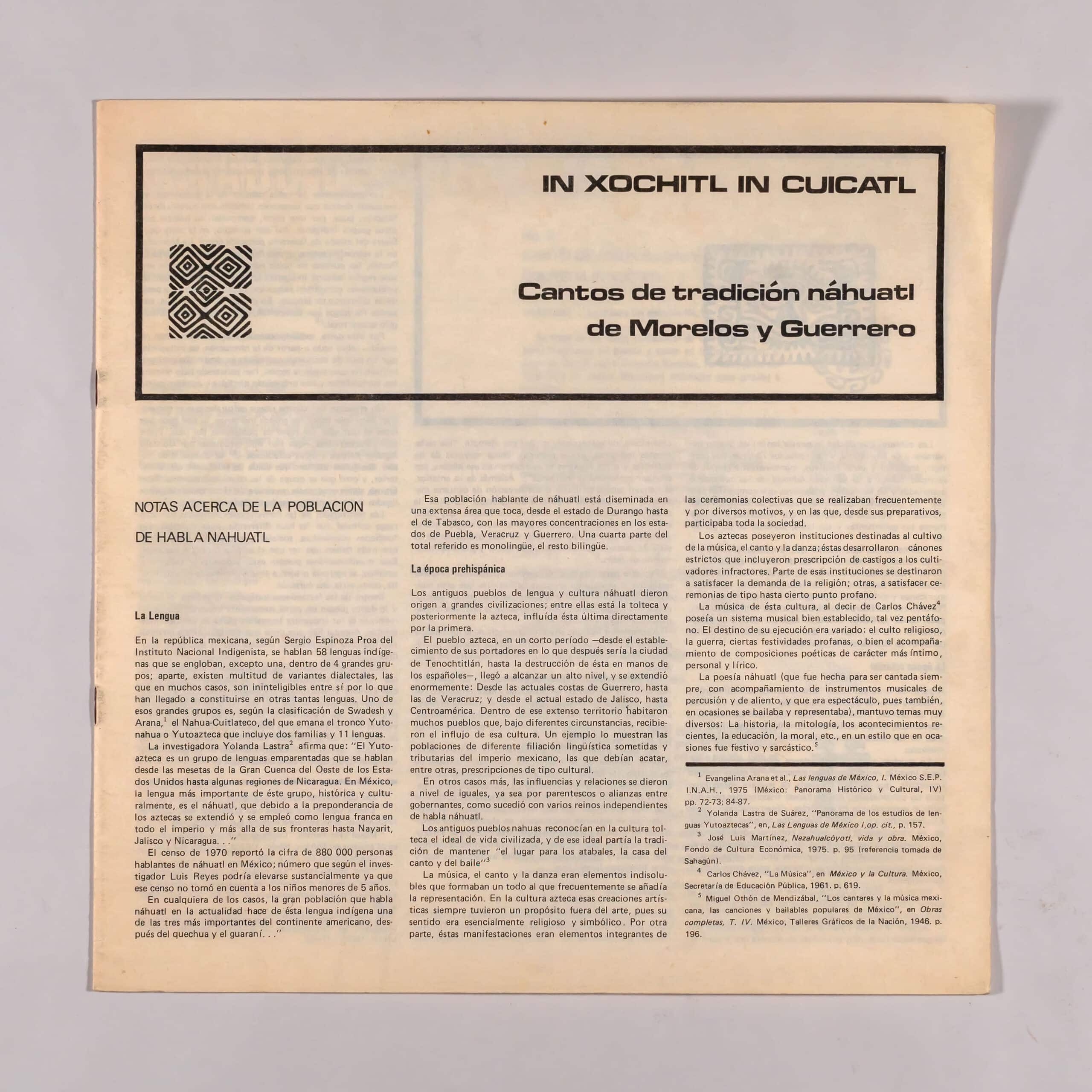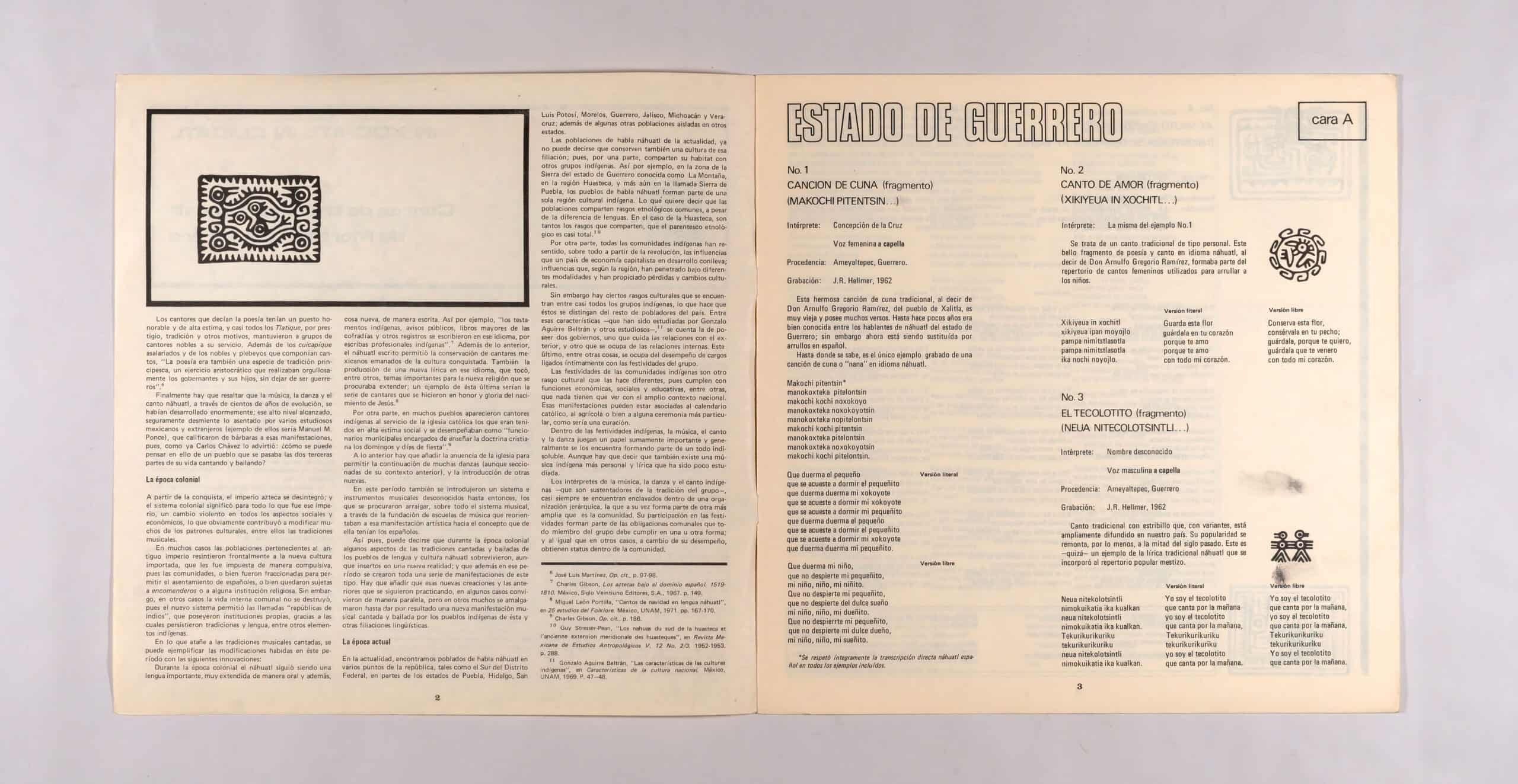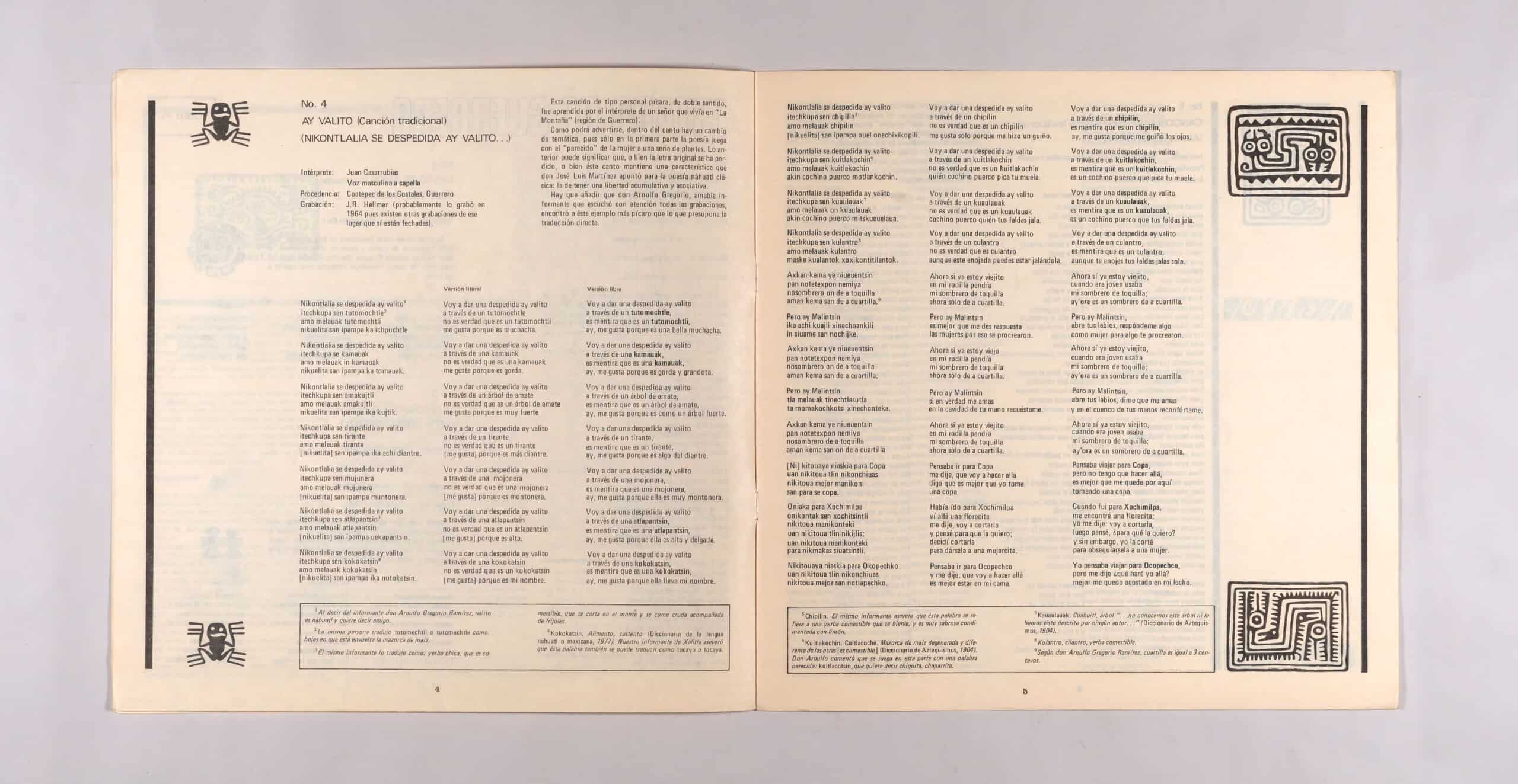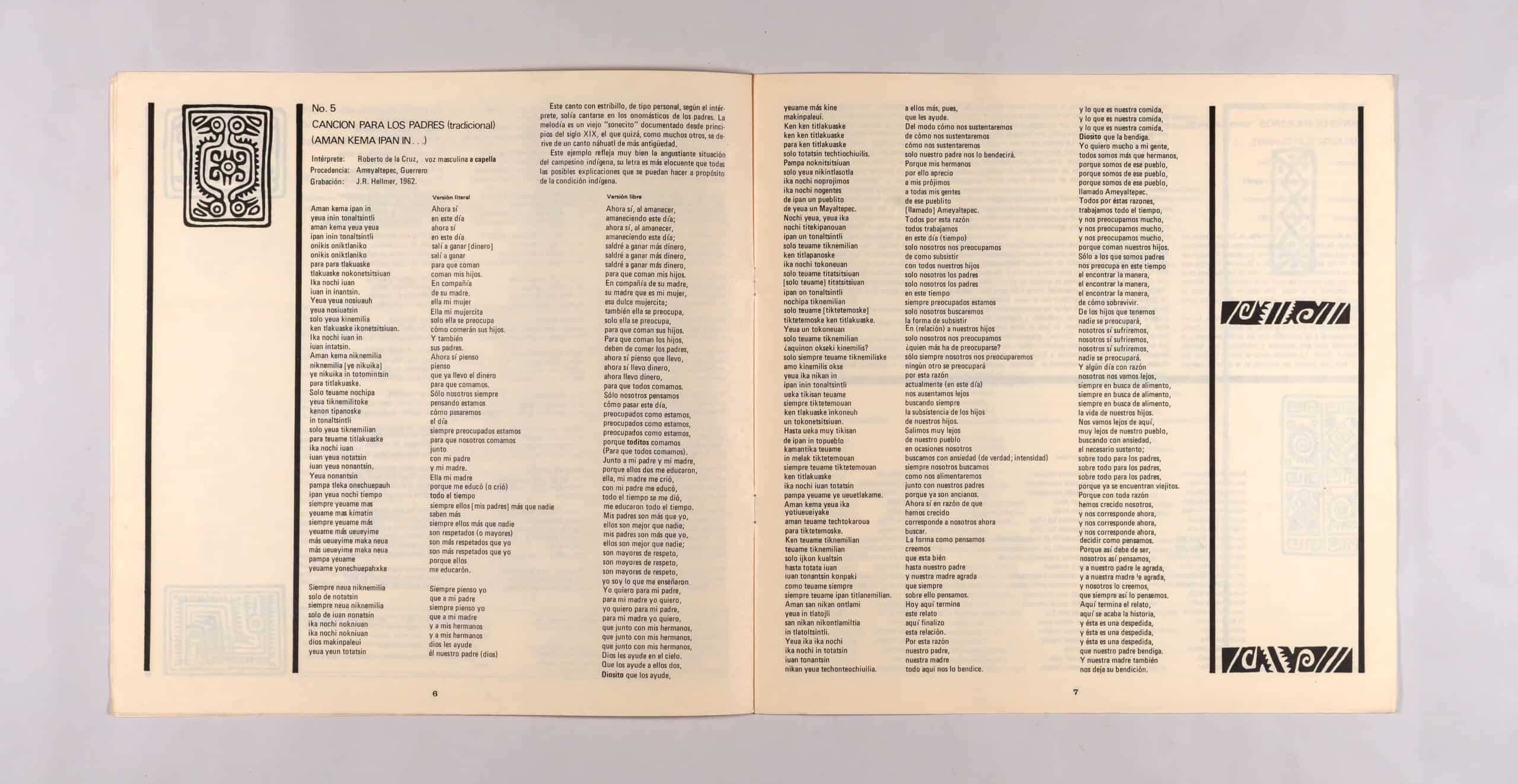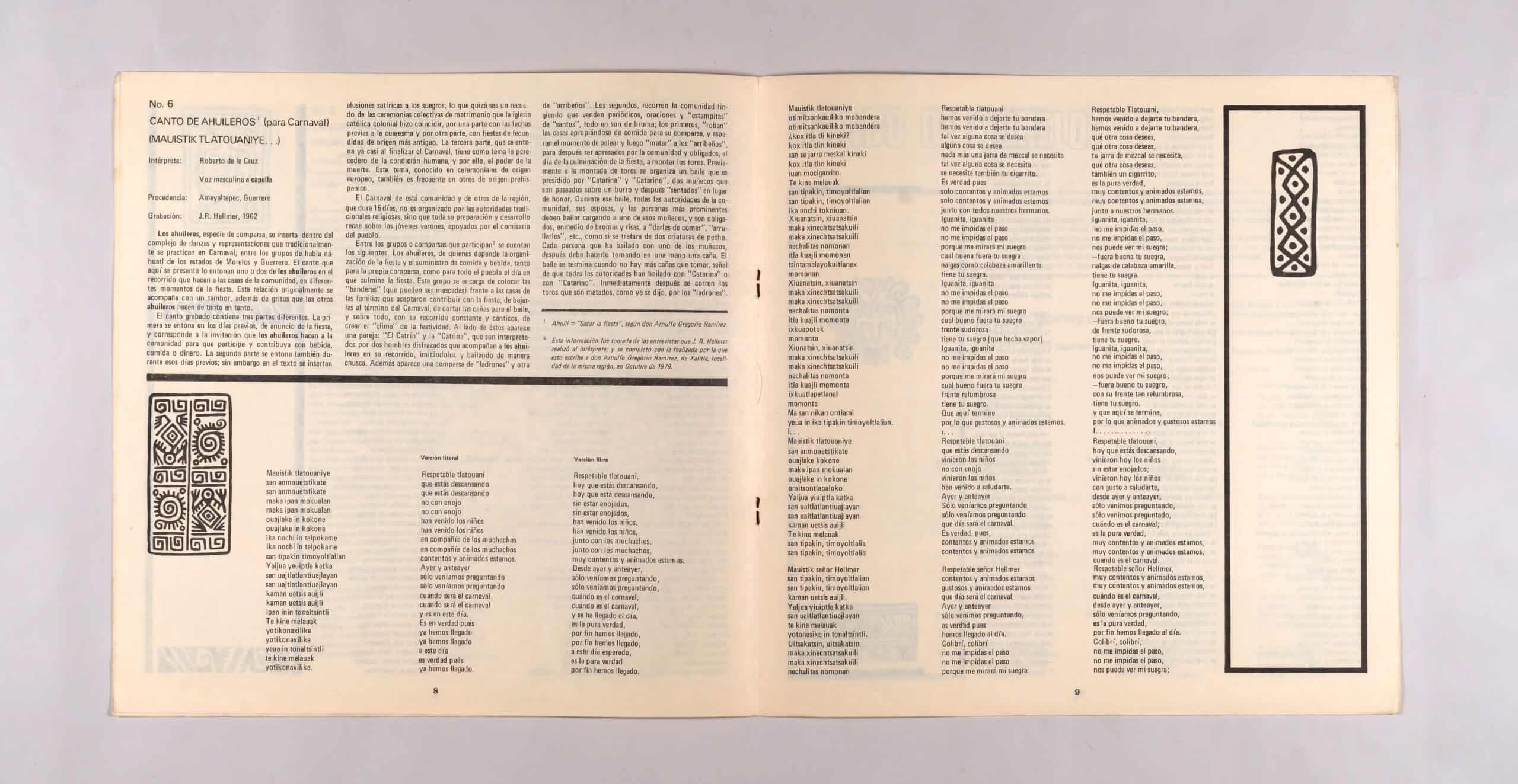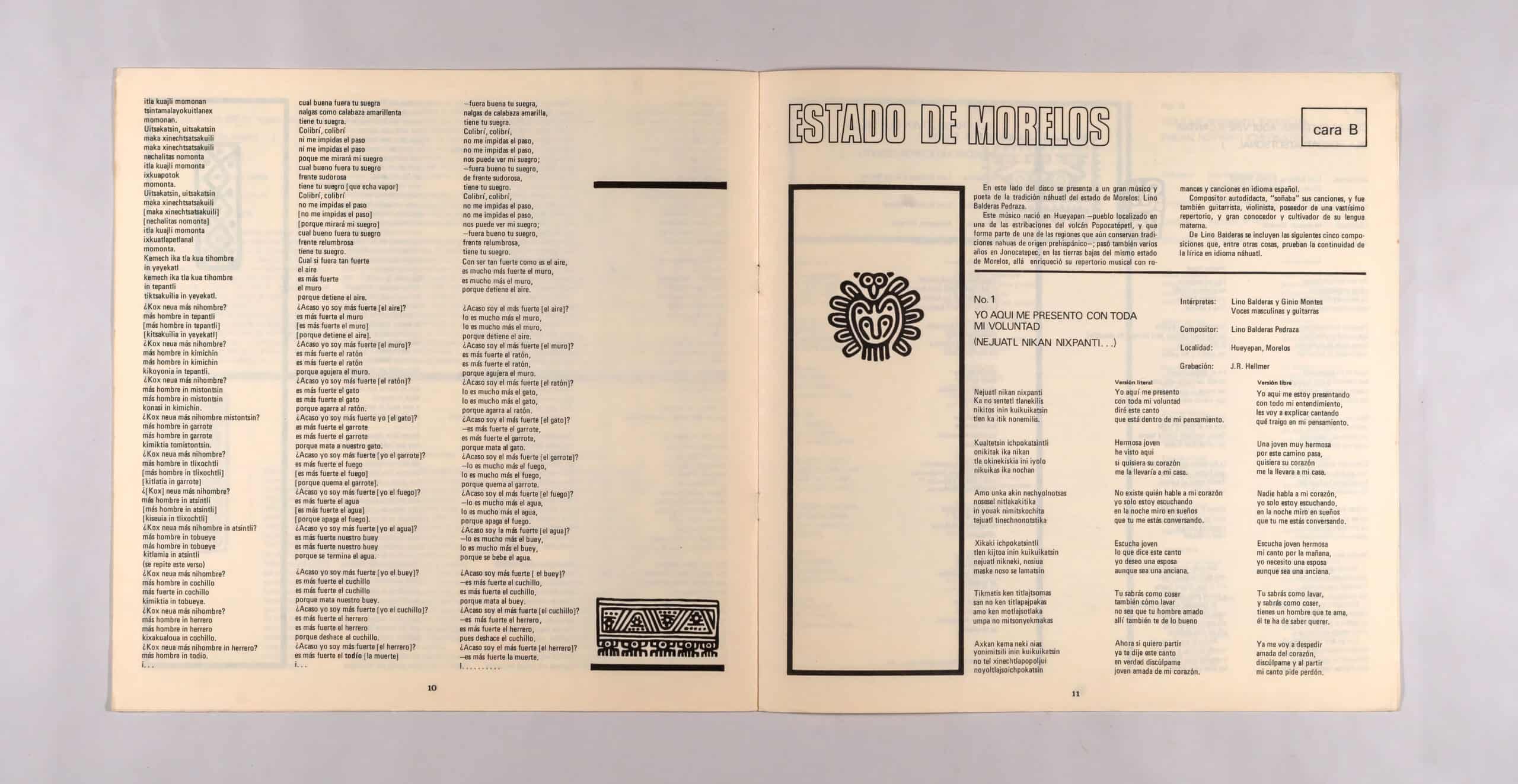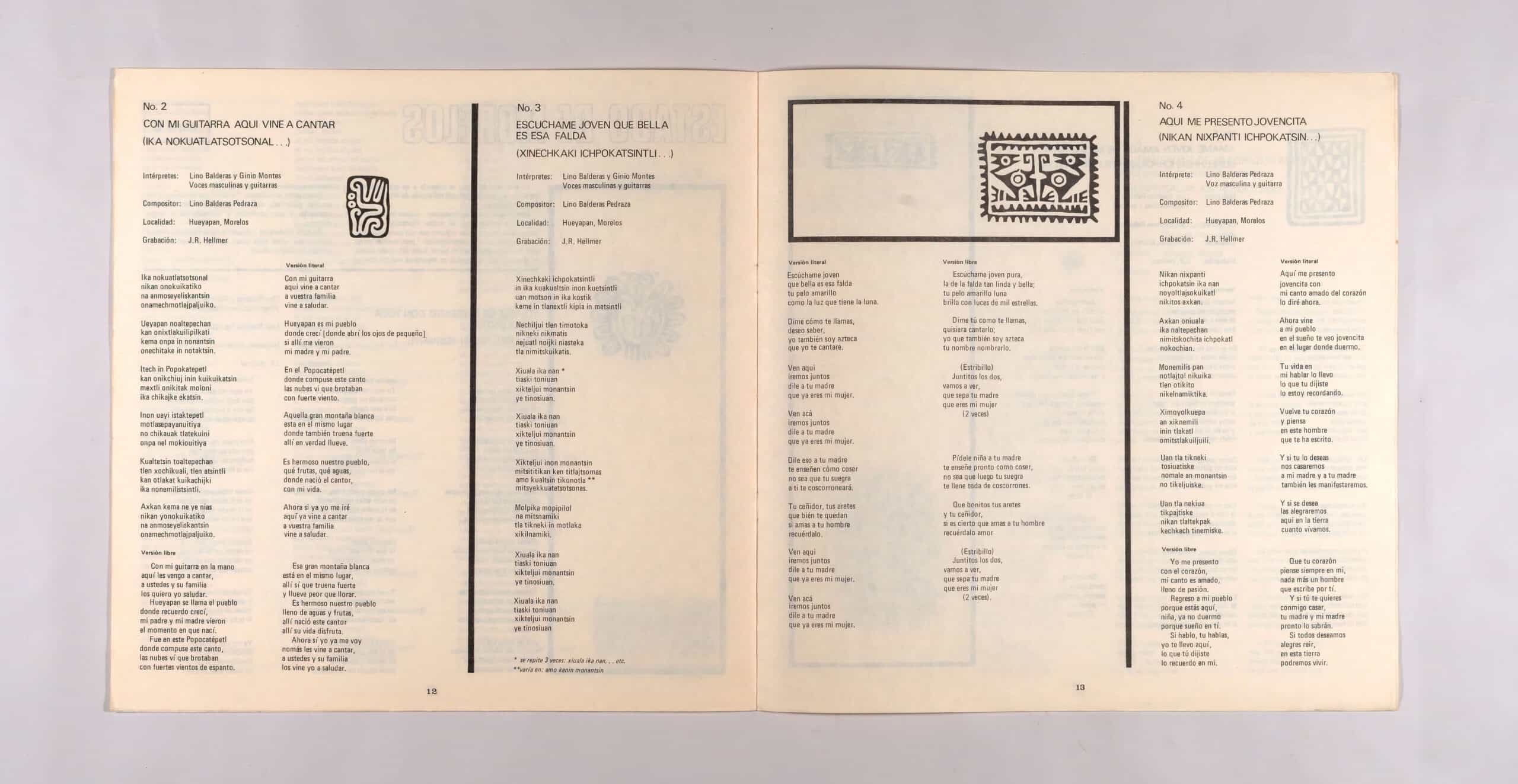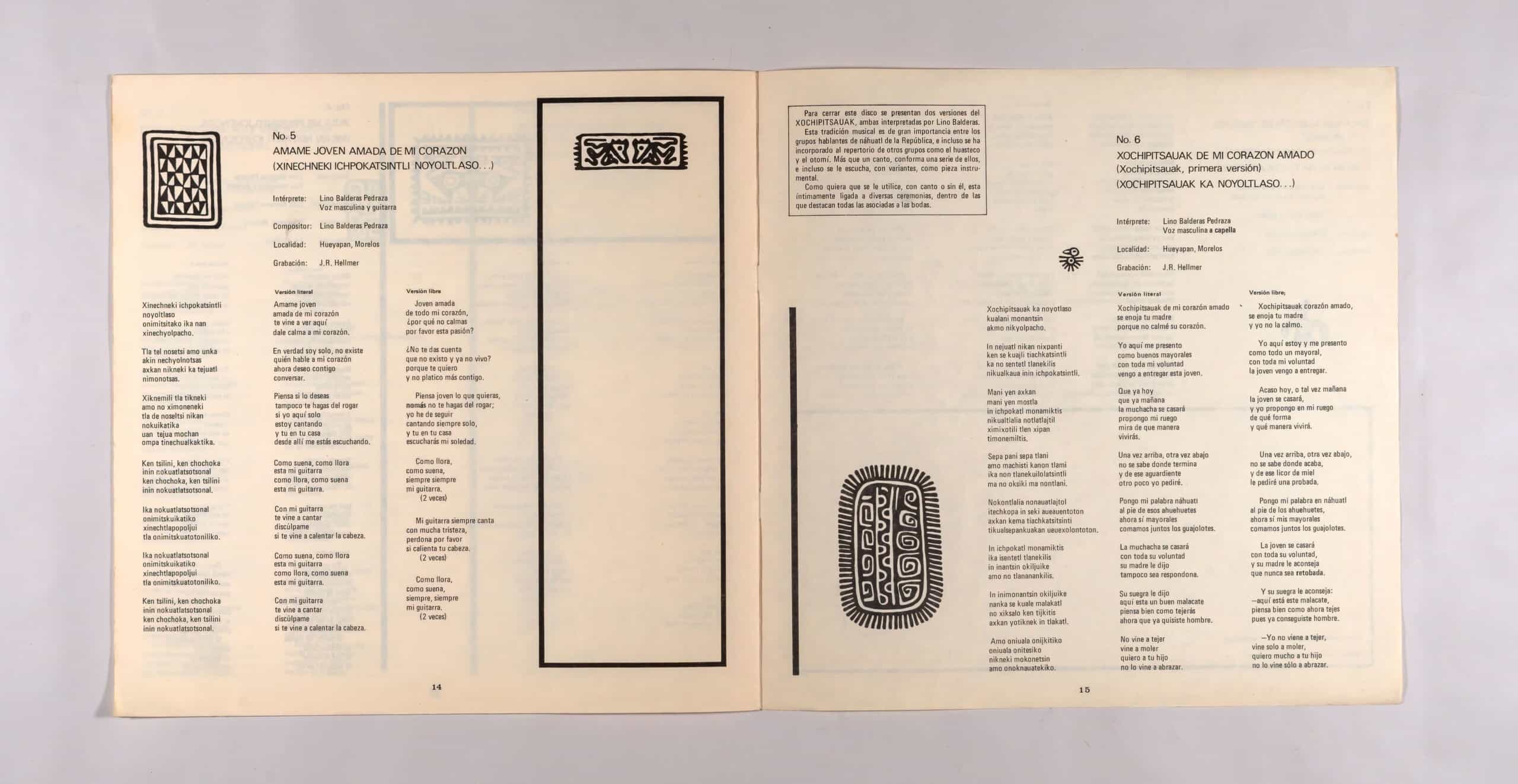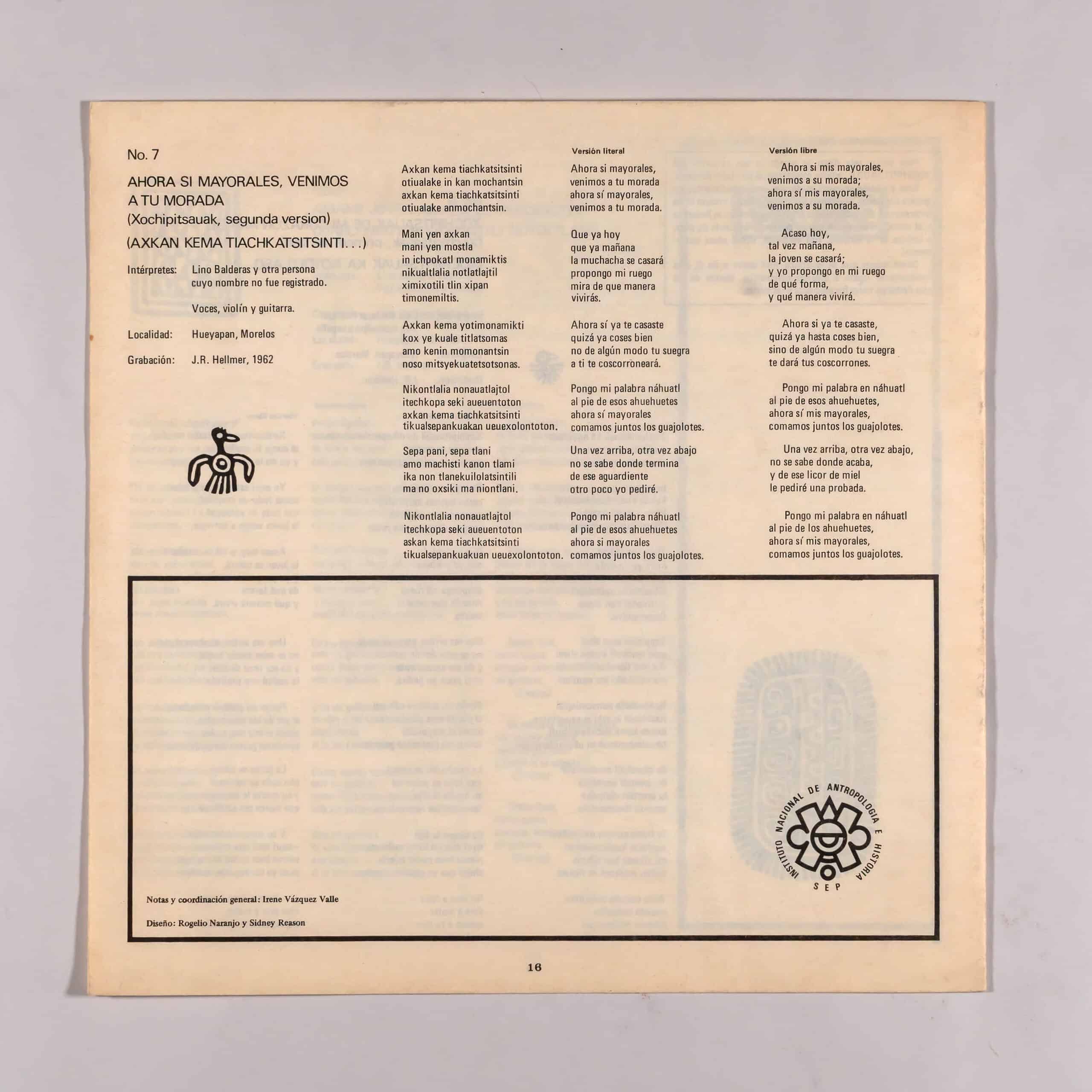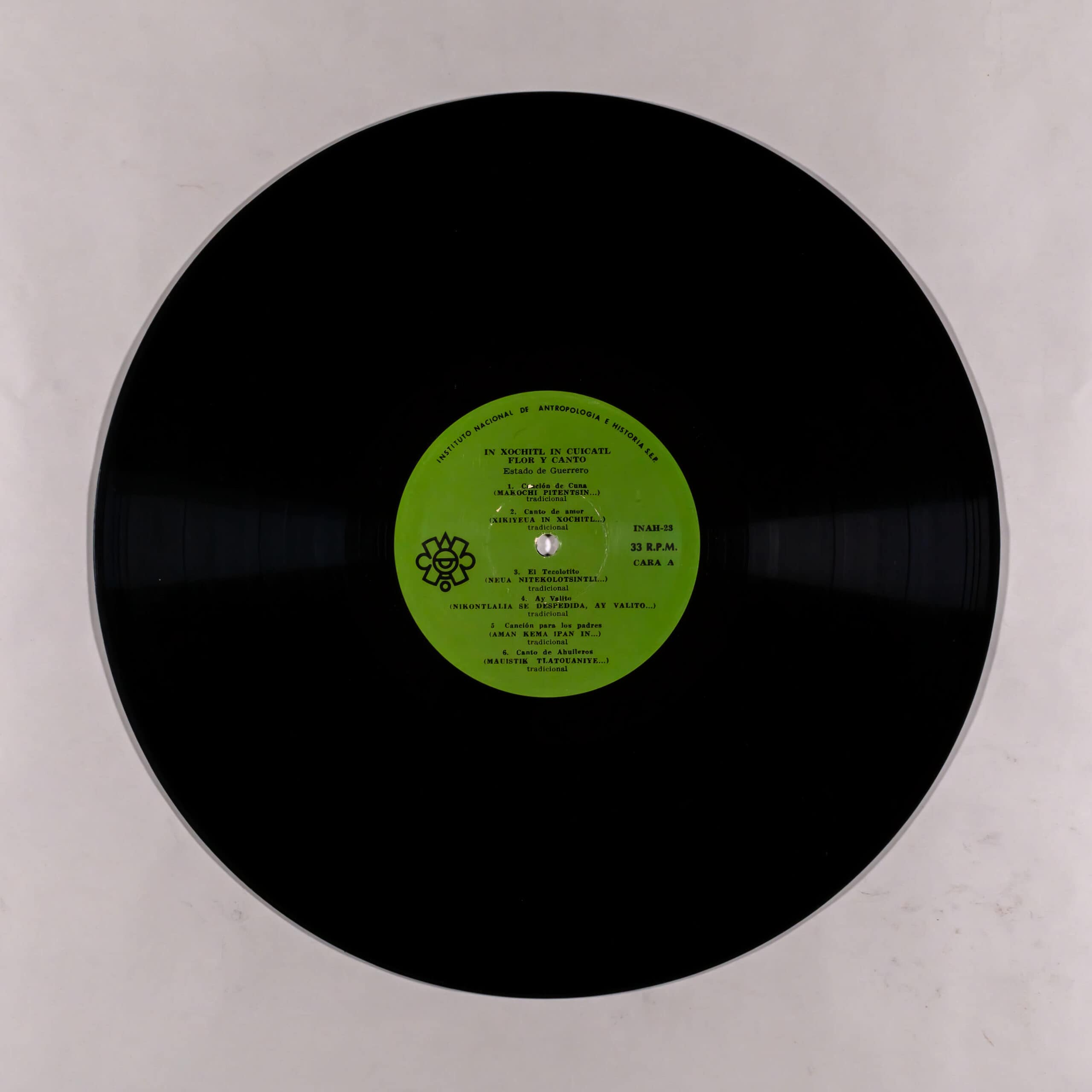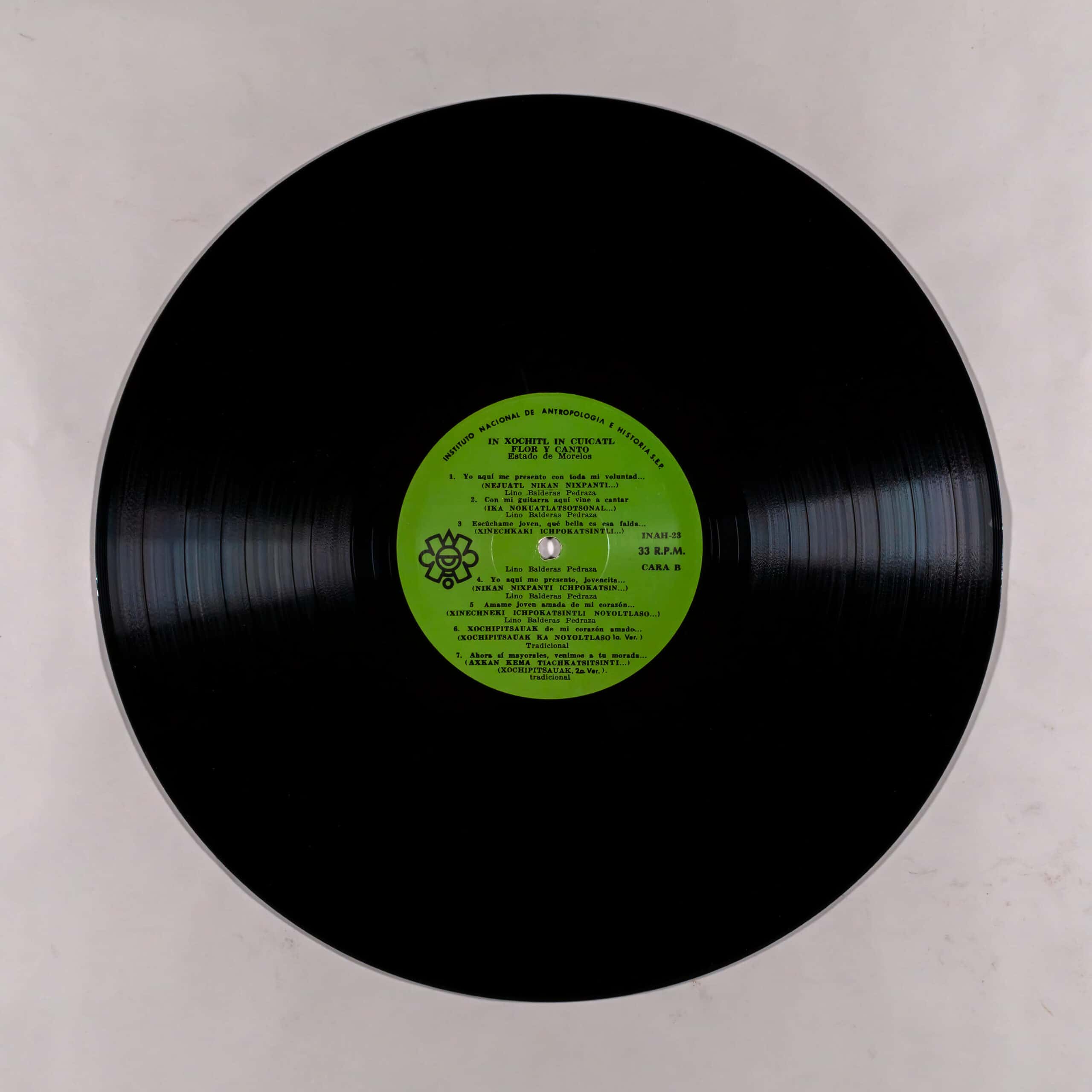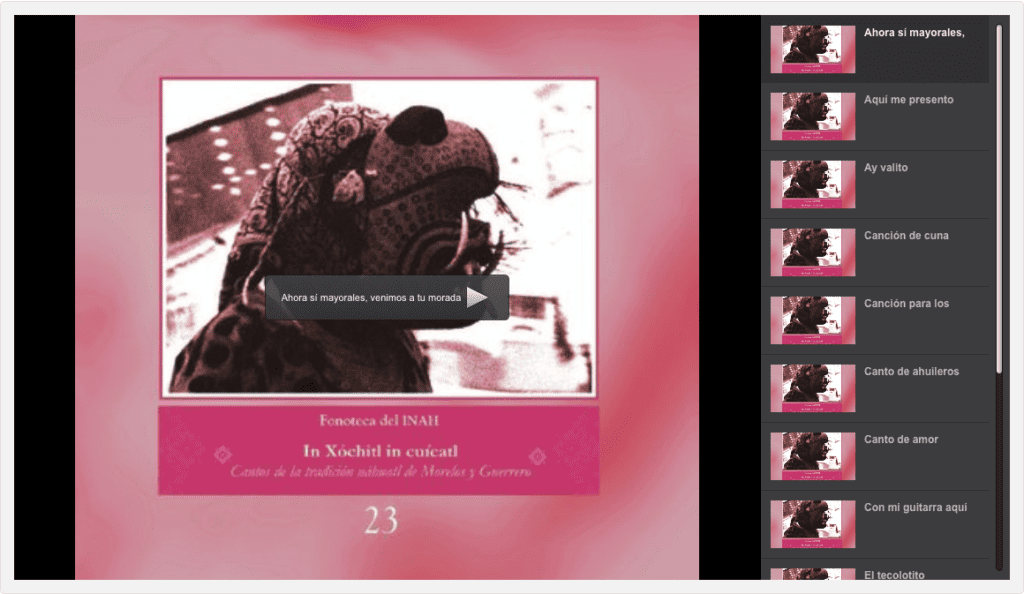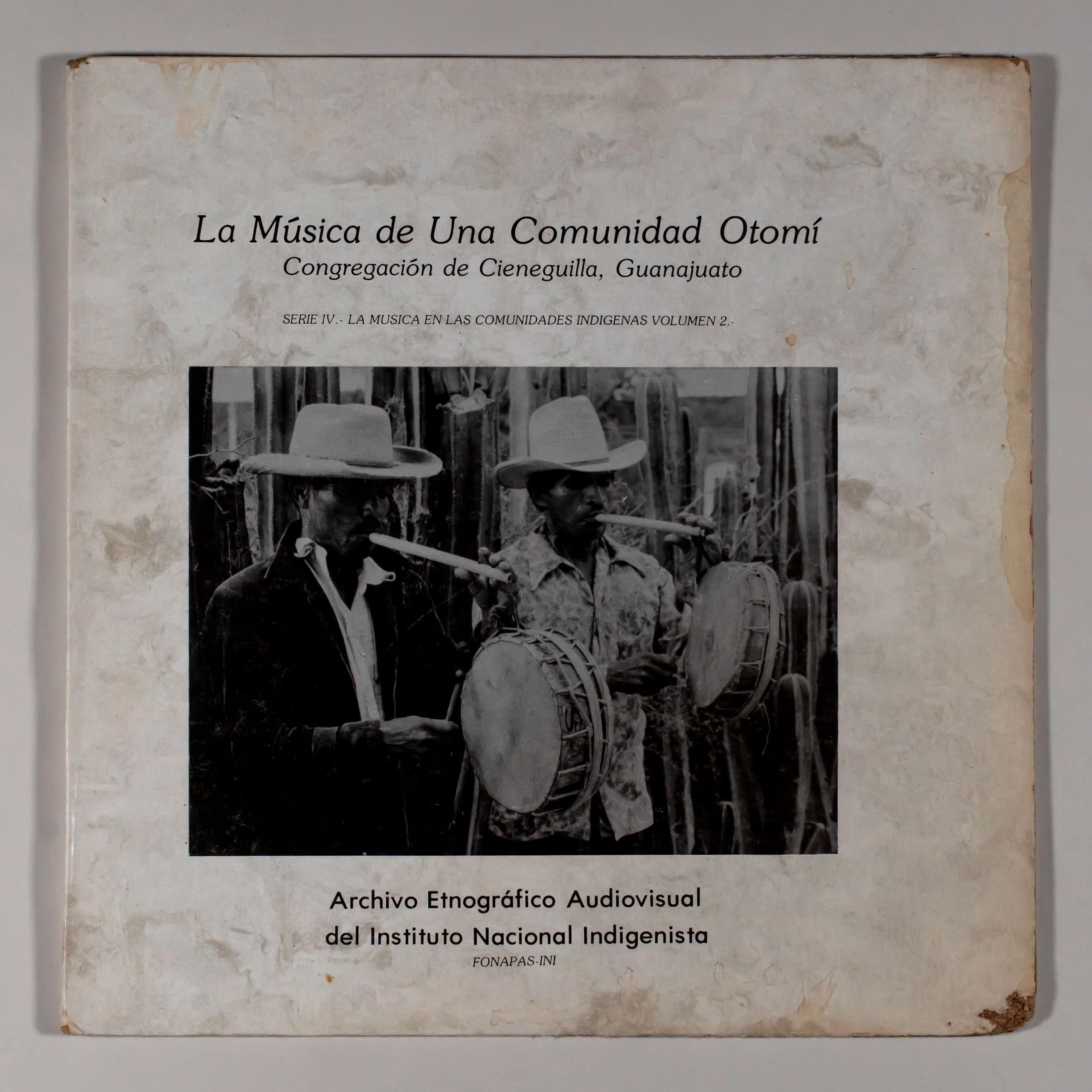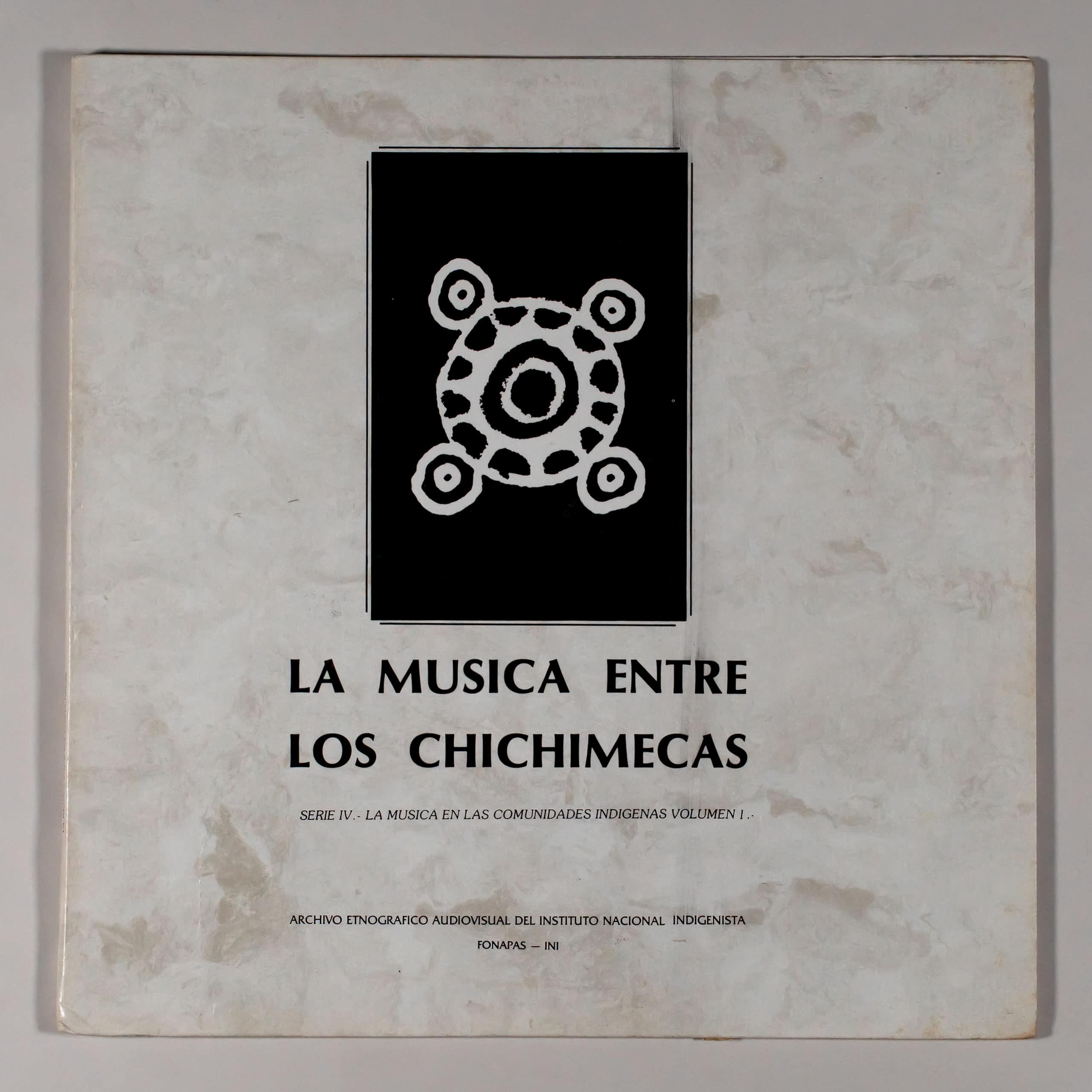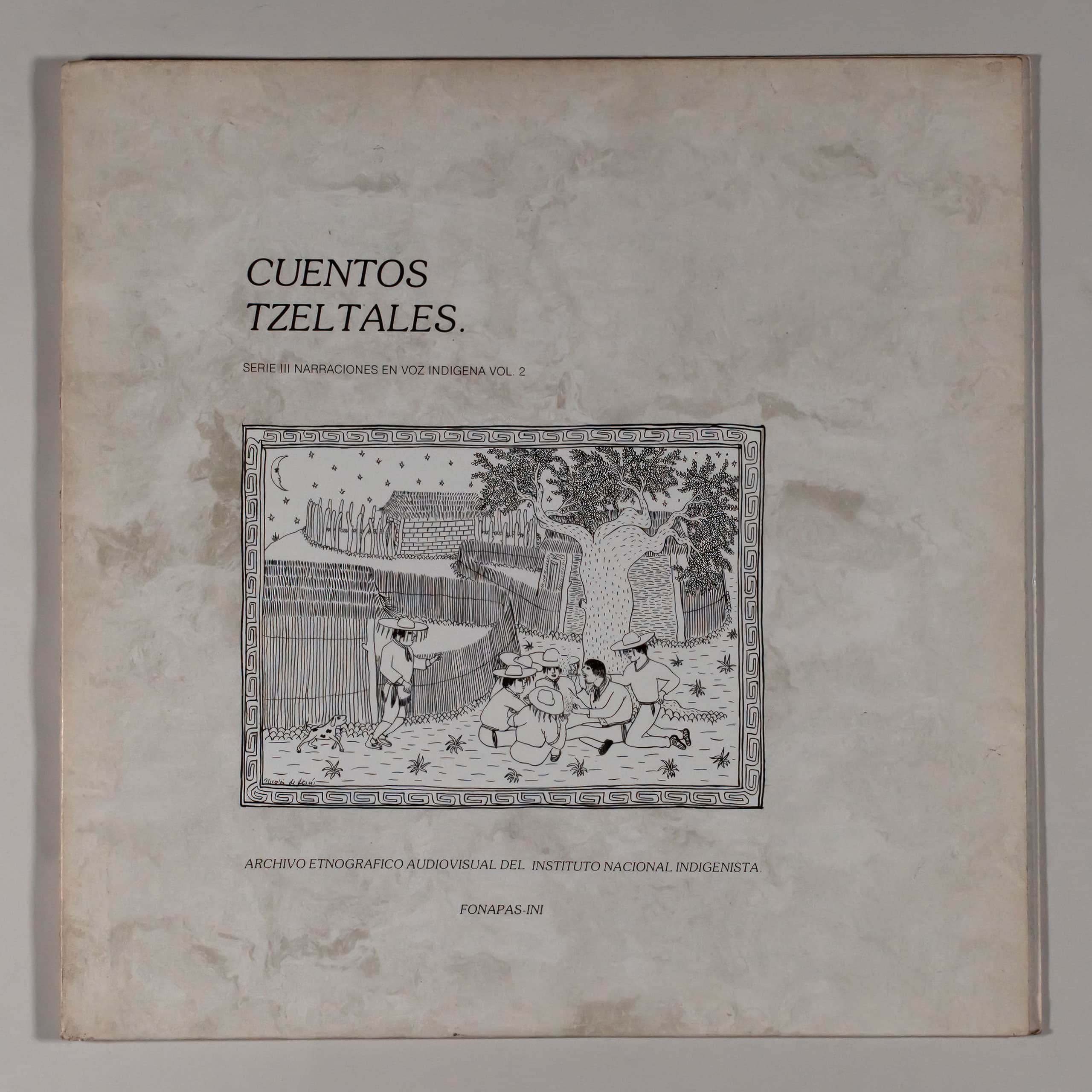IN XOCHITL IN CUICATL: SONGS OF THE NAHUATL TRADITION OF MORELOS AND GUERRERO
INAH SEP
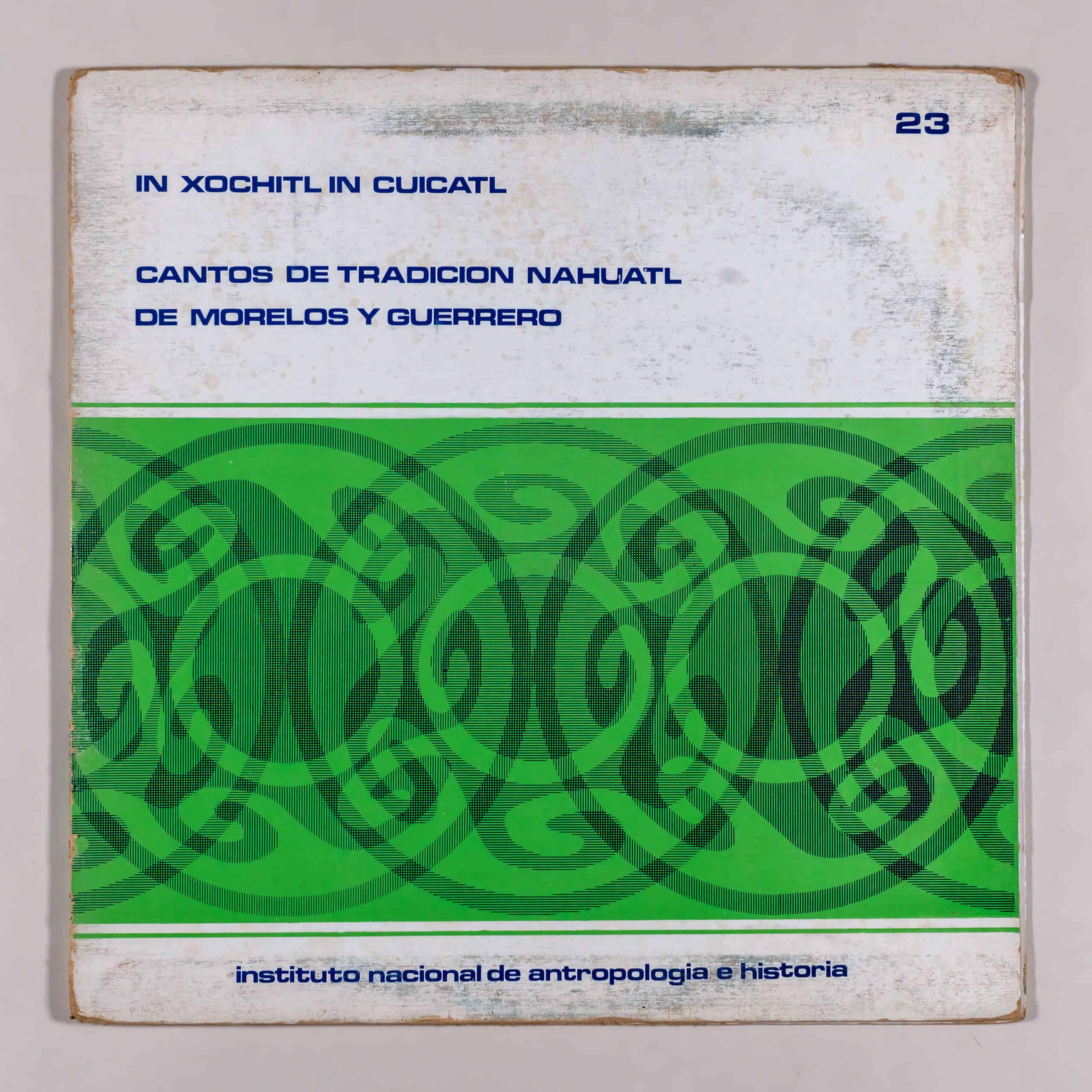
|
Label: INAH-SEP INAH-23 Released: 1980 |
Country: Mexico Genre: Song |
Info:
IN XOCHITL IN CUICATL
SONGS OF THE NAHUATL TRADITION OF MORELOS AND GUERRERO
NOTES ABOUT THE NÁHUATL-SPEAKING POPULATION
Language
In the Mexican Republic, according to Sergio Espinoza Proa of the National Indigenous Institute, 58 indigenous languages are spoken that are included, except one, within 4 large groups; In addition, there are many dialectal variants, which in many cases are mutually unintelligible, which is why they have become as many languages. One of these large groups is, according to the classification of Swadesh and Arana¹, the Nahua-Cuitlateco, from which the Yuto-Nahua or Yutoaztec trunk emanates, which includes two families and 11 languages.
The researcher Yolanda Lastra² affirms that: “Yuto-Aztec is a group of related languages that are spoken from the plateaus of the Great Basin of the Western United States to some regions of Nicaragua. In Mexico, the most important language of this group Historically and culturally, it is Nahuatl, which due to the preponderance of the Aztecs spread and was used as a lingua franca throughout the empire and beyond its borders to Nayarit, Jalisco and Nicaragua…”
The 1970 census reported the figure of 880,000 Nahuatl-speaking people in Mexico; number that according to the researcher Luis Reyes could rise substantially, since that census did not take into account children under 5 years of age.
In any case, the large population that speaks Nahuatl today makes this indigenous language one of the three most important in the American continent, after Quechua and Guarani…”
This Nahuatl-speaking population is spread over an extensive area that spans from the state of Durango to Tabasco, with the largest concentrations in the states of Puebla, Veracruz, and Guerrero. A quarter of the total reported is monolingual, the rest bilingual.
The prehispanic era
The ancient peoples of the Nahuatl language and culture gave rise to great civilizations; Among them is the Toltec and later the Aztec, the latter directly influenced by the former.
The Aztec people, in a short period – from the establishment of their carriers in what would later be the city of Tenochtitlán, until its destruction in the hands of the Spanish – reached a high level, and spread enormously: From the current coasts of Guerrero, up to those of Veracruz; and from the current state of Jalisco, to Central America. Within this extensive territory, many peoples inhabited which, under different circumstances, received the influence of that culture. An example is shown by the populations of different linguistic affiliations subjected and tributaries of the Mexican empire, which had to abide by, among other, cultural prescriptions.
In still other cases, the influences and relationships occurred at the level of equals, either by kinship or alliances between rulers, as happened with several independent Nahuatl-speaking kingdoms.
The ancient Nahua peoples recognized in the Toltec culture the ideal of civilized life, and from this ideal began the tradition of maintaining “the place for the drums, the house of singing and dancing”.³
Music, song and dance were indissoluble elements that formed a whole to which representation was frequently added. In the Aztec culture, these artistic creations always had a purpose outside of art, since their meaning was essentially religious and symbolic. On the other hand, these demonstrations were integral elements of the collective ceremonies that were carried out frequently and for various reasons, and in which, from their preparations, the whole society participated.
The Aztecs possessed institutions destined to the cultivation of music, song and dance; they developed strict canons that included prescribing punishments for offending growers. Part of those institutions were destined to satisfy the demand of religion; others, to satisfy ceremonies of a somewhat profane nature.
According to Carlos Chávez⁴, the music of this culture had a well-established musical system, perhaps a pentaphone. The destination of its execution was varied: religious worship, war, certain profane festivities, or the accompaniment of poetic compositions of a more intimate, personal and lyrical nature.
Nahuatl poetry (which was made to always be sung, accompanied by percussion and breath musical instruments, and which was a show, since it was also danced and represented on occasions), maintained very diverse themes: history, mythology, recent events, education, morality, etc., in a style that was sometimes playful and sarcastic.⁵
The singers who said the poetry had an honorable position and high esteem, and almost all the Tlatique, for prestige, tradition and other reasons, kept groups of noble singers at their service. In addition to the salaried cuicapique and the nobles and commoners who composed songs, “Poetry was also a kind of princely tradition, an aristocratic exercise that rulers and their sons carried out proudly, without ceasing to be warriors.”⁶
Finally, it should be noted that Nahuatl music, dance and song, through hundreds of years of evolution, had developed enormously: the high level reached surely refutes what has been established by various Mexican and foreign scholars (an example of which would be Manuel M. Ponce), who described these demonstrations as barbaric, because, as Carlos Chávez already warned: how can you think of this from a people who spent two thirds of their lives singing and dancing?
Colonial times
After the conquest, the Aztec empire disintegrated; And the colonial system meant for all that was that empire, a violent change in all social and economic aspects, which obviously contributed to modifying many of the cultural patterns, including musical traditions.
In many cases, the populations belonging to the old empire resented the new imported culture, which was compulsively imposed on them, since the communities were either divided to allow the settlement of Spaniards, or they were subject to encomenderos or some religious institution. . However, in other cases the internal communal life was not destroyed, since the new system allowed the so-called “indian republics”, which had their own institutions, thanks to which traditions and language persisted, among other indigenous elements.
As far as the sung musical traditions are concerned, the modifications that occurred in this period can be exemplified with the following innovations:
During the colonial era, Nahuatl continued to be an important language, widely spoken orally and also, something new, in writing. Thus, for example, “the indigenous wills, public notices, ledgers of the brotherhoods and other records were written in that language, by indigenous professional scribes.”⁷ In addition to the above, written Nahuatl allowed the conservation of Mexican songs emanating from the conquered culture. Also the production of a new lyric in that language, which touched, among others, important themes for the new religion that was sought to spread; an example of the latter would be the series of songs that were made in honor and glory of the birth of Jesus.⁸
On the other hand, in many towns indigenous singers appeared at the service of the Catholic Church who were held in high social esteem and worked as “municipal officials in charge of teaching Christian doctrine on Sundays and holidays.”⁹
To this we must add the consent of the church to allow the continuation of many dances (although sectioned from their previous context), and the introduction of new ones.
In this period, a hitherto unknown musical system and instruments were also introduced, which they sought to take root, especially the musical system, through the founding of music schools that reoriented this artistic manifestation towards the concept that the artists had of it. Spanish people.
Thus, it can be said that during the colonial era some aspects of the sung and danced traditions of the peoples of the Nahuatl language and culture survived, although inserted in a new reality; and that also in that period a whole series of demonstrations of this type were created. It must be added that these new creations and the previous ones that continued to be practiced, in some cases coexisted in parallel, but in many others they amalgamated until they resulted in a new musical manifestation sung and danced by the indigenous peoples of this and other linguistic affiliations.
The present time
At present, we find Nahuatl-speaking towns in various parts of the republic, such as the South of the Federal District, in parts of the states of Puebla, Hidalgo, San Luis Potosí, Morelos, Guerrero, Jalisco, Michoacán and Veracruz; plus a few other isolated populations in other states.
Today’s Nahuatl-speaking populations can no longer be said to also preserve a culture of that affiliation; because, on the one hand, they share their habitat with other indigenous groups. Thus, for example, in the area of the Sierra in the state of Guerrero known as La Montaña, in the Huasteca region, and even more so in the so-called Sierra de Puebla, the Nahuatl-speaking peoples form part of a single indigenous cultural region. Which means that the populations share common ethnological features, despite the difference in languages. In the case of the Huasteca, there are so many features that they share, that the ethnological relationship is almost total.¹⁰
On the other hand, all the indigenous communities have resented, especially since the revolution, the influences that a country with a developing capitalist economy entails; influences that, depending on the region, have penetrated under different modalities and have led to losses and cultural changes.
However, there are certain cultural traits that are found among almost all indigenous groups, which makes them stand out from the rest of the country’s inhabitants. Among these characteristics –which have been studied by Gonzalo Aguirre Beltrán and other scholars–,¹¹ is that of having two governments, one that takes care of foreign relations, and the other that deals with internal relations. The latter, among other things, deals with the performance of charges closely linked to the group’s festivities.
The festivities of the indigenous communities are another cultural feature that makes them different, since they fulfill economic, social and educational functions, among others, that have nothing to do with the broad national context. These manifestations may be associated with the Catholic calendar, the agricultural calendar, or with some more particular ceremony, such as a cure.
Within the indigenous festivities, music, song and dance play an extremely important role and are generally found to be part of an indissoluble whole. Although it must be said that there is also a more personal and lyrical indigenous music that has been little studied.
The interpreters of indigenous music, dance and song –who are supporters of the group’s tradition– are almost always located within a hierarchical organization, which in turn forms part of a broader one that is the community. Their participation in the festivities are part of the communal obligations that every member of the group must fulfill in one way or another; and as in other cases, in exchange for their performance, they obtain status within the community.
¹ Evangelina Arana et al., The languages of Mexico, I. Mexico S.E.P. I.N.A.H., 1975 (Mexico: Historical and Cultural Panorama, IV) pp. 72-73; 84-87.
² Yolanda Lastra de Suárez, “Panorama of Yutoaztecan language studies”, in, Las Lenguas de México l, op. cit., p. 157.
³ José Luis Martínez, Nezahualcóyotl, life and work. Mexico, Economic Culture Fund, 1975. p. 95 (reference taken from Sahagún).
⁴ Carlos Chávez, “La Música”, in Mexico and Culture. Mexico, Ministry of Public Education, 1961. p. 619.
⁵ Miguel Othón de Mendizábal, “Los cantares y la música mexicana, las canciones y bailables populares de México”, in Obras completas, T. IV. Mexico, Graphic Workshops of the Nation, 1946, p. 196.
⁶ José Luis Martínez, Op. cit., p. 97-98.
⁷ Charles Gibson, The Aztecs under Spanish rule. 1519 1810. Mexico, Siglo Veintiuno Editores, S.A., 1967. p. 149.
⁸ Miguel León Portilla, “Christmas songs in the Nahuatl language”, in 25 studies of Folklore, Mexico, UNAM, 1971. pp. 167-170.
⁹ Charles Gibson, Op. cit., p. 186.
¹⁰ Guy Stresser Pean, “Los nahuas du sud de la huasteca et l’ancienne meridionale des huasteques extension”, in Mexican Journal of Anthropological Studies V. 12 No. 2/3. 1962-1963 p. 288.
¹¹ Gonzalo Aguirre Beltrán, “The characteristics of indigenous cultures”, in Characteristics of the national culture. Mexico, UNAM, 1969. P. 47-48.
face A
GUERRERO STATE
No. 1
LULLABY (fragment)
(MAKOCHI PITENTSIN…)
Performer: Concepción de la Cruz, a cappella female voice.
Origin: Ameyaltepec, Guerrero.
Recording: J.R. Hellmer, 1962
This beautiful traditional lullaby, according to Don Arnulfo Gregorio Ramírez, from the town of Xalitla, is very old and has many verses. Until a few years ago it was well known among the Nahuatl speakers of the state of Guerrero; however it is now being replaced by lullabies in Spanish. As far as is known, it is the only recorded example of a lullaby or “nana” in the Nahuatl language.
Makochi pitentsin*
manokoxteka pitelontsin
makochi kochi noxokoyo
manokoxteka noxokoyotsin
manokoxteka nopitelontsin
makochi kochi pitentsinntek
manokoxteka pitelontsin
manokoxteka noxokoyotsin
makochi kochi pitelontsin.
Verbatim version
Let the little one sleep
let the little one lie down to sleep
sleep sleep my xokoyote
let my xokoyote lie down to sleep
let my little one lie down to sleep
let the little one sleep
let the little one lie down to sleep
let my xokoyote lie down to sleep
sleep sleep my little one.
Free version
Let my child sleep
don’t wake up my little one,
my boy, boy, my little boy.
Don’t wake up my little one,
don’t wake up from the sweet dream
my child, child, my little owner.
Don’t wake up my little one,
that my sweet owner does not wake up,
my child, child, my dream.
*The direct Nahuatl Spanish transcription was completely respected in all the examples included.
No. 2
SONG OF LOVE (fragment)
(XIKIYEUA IN XOCHITL…)
Performer: The same as example No.1
It is a traditional song of a personal type. This beautiful fragment of poetry and song in the Nahuatl language, according to Don Arnulfo Gregorio Ramírez, was part of the repertoire of feminine songs used to lull children to sleep.
Xikiyeua in xochitl
xikiyeua ipan moyojlo
pampa nimitstlasotla
pampa nimitstlasotla
ika nochi nayojlo.
Verbatim version
Save this flower
keep it in your heart
because I love you
because I love you
with all my heart.
Free version
Keep this flower
keep it on your chest;
keep it, because I love you,
keep it, I worship you
with all my heart.
No. 3
THE TECOLOTITO (fragment)
(NEUA NITECOLOTSINTLI…)
Performer: Name unknown, a cappella male voice
Origin: Ameyaltepec, Guerrero
Recording: J.R. Hellmer, 1962
Traditional song with a refrain that, with variants, is widely spread in our country. Its popularity dates back at least to the middle of the last century. This is –perhaps– an example of traditional Nahuatl lyric that was incorporated into the popular mestizo repertoire.
Neua nitekolatsintli
nimokuikatia ika kualkan
neua nitekolotsintli
nimakuikatia ika kualkan.
Tekurikurikuriku
tekurikurikuriku
neua nitekolotsintli
nimokuikatia ika kualkan.
Verbatim version
I am the little owl
who sings in the morning
I am the little owl
who sings in the morning,
Tekurikurikuriku
tekurikurikuriku
I am the little owl
who sings in the morning
Free version
I am the little owl
who sings in the morning
I am the little owl
who sings in the morning,
Tekurikurikuriku
tekurikurikuriku
I am the little owl
who sings in the morning.
No. 4
AY VALITO (Traditional song)
(NIKONTLALIA SE DESPEDIDA AY VALITO…)
Performer: Juan Casarrubias, a cappella male voice.
Origin: Coatepec of the Costales, Guerrero
Recording: J.R. Hellmer (Probably recorded it in 1964 as there are other recordings from that place that are dated).
This mischievous personal song, with double meaning, was learned by the interpreter from a man who lived in “La Montaña” (Guerrero region). As can be seen, within the song there is a change of theme, since only in the first part does the poetry play with the “resemblance” of the woman to a series of plants. This may mean that either the original lyrics have been lost, or this song maintains a characteristic that José Luis Martínez pointed out for classical Nahuatl poetry: that of having a cumulative and associative freedom. It must be added that Mr. Arnulfo Gregorio, a kind informant who listened carefully to all the recordings, found this example more mischievous than what the direct translation presupposes.
Nikontlalia se despedida ay valito’
itechkupa sen tutomochtle²
amo melauak tutomochtli
nikuelita san ipampa ka ichpuchtle
Nikontlalia se despedida ay valito.
itechkupa se kamauak
amo melauak in kamauak.
nikuelita san ipampa ka tomauak.
Nikontlalia se despedida ay valito
itechkupa sen amakujtli
amo melauak amakujtli
[nikuelita] san ipampa ika kujtik.
Nikontlalia se despedida ay valito
itechkupa sen tirante
amo melauak tirante
[nikuelita] san ipampa ika achi diantre.
Nikontlalia se despedida ay valito
itechkupa sen mujunera
amo melauak mujunera
[nikuelita] san ipampa muntonera.
Nikontlalia se despedida ay valito
itechkupa sen atlapantsin³
amo melauak atlapantsin
[nikuelita] san ipampa uekapantsin.
Nikontlalia se despedida ay valito
itechkupa sen kokokatsin⁴
amo melauak kokokatsin
[nikuelita] san ipampa ika nutokatsin.
Nikontlalia se despedida ay valito
itechkupa sen chipilin⁵
amo melauak chipilin
[nikuelita] san ipampa ouel onechixikopili.
Nikontlalia se despedida ay valito
itechkupa sen kuitlakochin⁶
amo melauak kuitlakochin
akin cochino puerco motlankochin.
Nikontlalia se despedida ay valito
itechkupa sen kuaulauak⁷
amo melauak on kuaulauak
akin cochino puerco mitskueuelaua.
Nikontlalia se despedida ay valito
itechkupa sen kulantro⁸
amo melauak kulantro
maske kualantok xoxikontitilantok.
Axkan kema ye niueuentsin
pan notetexpon nemiya
nosombrero on de a toquilla
aman kema san de a cuartilla.⁹
Pero ay Malintsin
ika achi kuajli xinechnankili
in siuame san nochijke.
Axkan kema ye niueuentsin
pan notetexpon nemiya
nosombrero on de a toquilla
aman kema san de a cuartilla.
Pero ay Malintsin
tla melauak tinechtlasutla
ta momakochkotsi xinechonteka.
Axkan kema ye niueuentsin
pan notetexpon nemiya
nosombrero de a toquilla
aman kema san on de a cuartilla.
[Ni] kitouaya niaskia para Copa
uan nikitoua tlin nikonchiuas,
nikitoua mejor manikoni
san para se copa.
Oniaka para Xochimilpa
onikontak sen xochitsintli
nikitoua manikonteki
uan nikitoua tlin nikijlis;
uan nikitoua manikonteki
para nikmakas siuatsintli.
Nikitouaya niaskia para Okopechko
uan nikitoua tlin nikonchiuas
nikitoua mejor san notlapechko.
Verbatim version
I’m going to say goodbye, oh valito
via a tutomochtle
it is not true that he is a tutomochtli
I like it because she is a girl.
I’m going to say goodbye, oh valito
through a kamauak
it is not true that it is a kamauak
I like her because she is fat.
I’m going to say goodbye, oh valito
through an amate tree
It is not true that it is an amate tree
I like it because it is very strong.
I’m going to say goodbye, oh valito
through a brace
it is not true that it is a brace
[I like it] because it’s more devilish.
I’m going to say goodbye, oh valito
through a cairn
it is not true that she is a mojonera
[I like it] because she is montonera.
I’m going to say goodbye, oh valito
through an atlapantsin
it is not true that it is an atlapantsin
[I like] because she is tall.
I’m going to say goodbye, oh valito
through a kokokatsin
it is not true that he is a kokokatsin
[I like it] because it’s my name.
I’m going to say goodbye, oh valito
through a chipilín
It is not true that he is a chipilín nolo
I like him just because he winked at me.
I’m going to say goodbye, oh valito
through a kuitlakochin
it is not true that it is a kuitlakochin
who filthy pig bites your tooth.
I’m going to say goodbye, oh valito
through a kaulauak
It is not true that it is a kaulauak
filthy pig who pulls your skirts.
I’m going to say goodbye, oh valito
through a coriander
it is not true that it is cilantro
even though she is angry you may be pulling her.
Now if I’m old
on my knee dangled
my toquilla hat
Now only quarter to quarter.
But oh Malintsin
it is better that you give me an answer
That’s why women procreated.
now i’m old
on my knee dangled
my toquilla hat
Now only quarter to quarter.
But oh Malintsin
if you really love me
in the cavity of your hand lay me down.
Now if I’m old
on my knee dangled
my toquilla hat
Now only quarter to quarter.
I was thinking of going for the Cup
I told myself, what am I going to do there?
I say that it is better that I drink
a glass.
He had gone to Xochimilpa
I saw a little flower there
I told myself, I’m going to cut it
and I thought why do I want it;
I decided to cut it
to give it to a little woman.
I was thinking of going to Ocopechco
and I said to myself, what am I going to do there?
It’s better to be in my bed.
Free version
I’m going to say goodbye, oh valito
through a tutomochtle,
it is a lie that he is a tutomochtli,
oh, I like it because she is a beautiful girl.
I’m going to say goodbye, oh valito
through a kamauak,
It’s a lie that it’s a kamauak,
Oh, I like her because she’s fat and big.
I’m going to say goodbye, oh valito
through an amate tree,
It’s a lie that it’s an amate tree,
Oh, I like it because it’s like a strong tree.
I’m going to say goodbye, oh valito
through a brace,
It’s a lie that it’s a strap,
oh, I like it because it’s something of the devil.
I’m going to say goodbye, oh valito
through a cairn,
It’s a lie that she’s a mojonera
oh, I like it because she is very montonera.
I’m going to say goodbye, oh valito
through an atlapantsin,
It is a lie that she is an atlapantsin,
oh, I like her because she is tall and skinny.
I’m going to say goodbye, oh valito
through a kokokatsin,
it is a lie that she is a kokokatsin,
oh, I like it because she bears my name.
I’m going to give a farewell ay valito o
through a chipilín,
It’s a lie that he’s a chipilín
oh, I like it because he winked at me.
I’m going to say goodbye, oh valito
through a kuitlakochin,
it is a lie that he is a kuitlakochin,
It’s a filthy pig that itches your tooth.
I’m going to say goodbye, oh valito
through a kaulauak,
It is a lie that it is a kaulauak,
It’s a filthy pig that pulls your skirts.
I’m going to say goodbye, oh valito
through a cilantro,
It’s a lie that it’s a coriander,
Even if you get angry, you pull your skirts alone.
Now I am already old,
when he was young he used
my toquilla hat;
ay’ora is a pastern hat.
But oh Malintsin,
open your lips, answer me something
as a woman they procreated you for something.
Now I am already old,
when she was young she used
my toquilla hat;
ay’ora is a pastern hat.
But oh Malintsin,
open your lips, tell me you love me
and in the cup of your hands comfort me.
Now I am already old,
when he was young he used
my toquilla hat;
ay’ora is a pastern hat.
I was thinking of traveling to Copa,
but I don’t have to do there,
it is better that I stay here
having a drink
When I went to Xochimilpa,
I found a little flower;
I told myself: I’m going to cut it,
then I thought, what do I want it for?
And yet I cut her off
to give it to a woman.
I was thinking of traveling to Ocopechco,
but I said to myself, what will I do there?
I better stay lying on my bed.
¹ According to the informant Mr. Arnulfo Gregorio Ramírez, valito is Nahuatl and means friend.
² The same person translated totomochtli or tutomochtle as: leaves in which the corn cob is wrapped.
³ The same informant translated it as: yerba chica, which is edible, which is cut in the bush and eaten raw accompanied by beans.
⁴ Kokokatsin. Food, sustenance (Dictionary of the Nahuatl or Mexican language, 1977). Our informant from Xalitla asserted that this word can also be translated as namesake or namesake.
⁵ Chipilin. The same informant asserts that this word refers to an edible herb that is boiled, and is very tasty seasoned with lemon.
⁶ Kuitlakochin. cuitlacoche. Degenerate ear of corn and different from the others [it is edible] (Dictionary of Aztequisms, 1904). Don Arnulfo commented that he is playing in this part with a similar word: kuitlacotsin, which means little, short.
⁷ Kaauaulauak. Cuahuitl, tree “…we do not know this tree nor have we seen it described by any author…” (Dictionary of Aztequisms, 1904).
⁸ Kulantro, coriander, edible herb.
⁹ According to Mr. Arnulfo Gregorio Ramírez, a page is equal to 3 cents.
No. 5
SONG FOR PARENTS (traditional)
(AMAN KEMA IPAN IN…)
Performer: Roberto de la Cruz, a cappella male voice.
Origin: Ameyaltepec, Guerrero
Recording: J.R. Hellmer, 1962.
This song with a refrain, of a personal nature, according to the performer, used to be sung on parents’ birthdays. The melody is an old “sonecito” documented from the beginning of the 19th century, which perhaps, like many others, derives from an older Nahuatl chant. This example reflects very well the distressing situation of the indigenous peasant, its letter is more eloquent than all the possible explanations that can be made regarding the indigenous condition.
Aman kema ipan in
yeua inin tonaltsintli
aman kema yeua yeua
ipan inin tonaltsintli
onikis oniktlaniko
onikis oniktlaniko
para para tlakuaske
tlakuaske nokonetsitsiuan
Ika nochi iuan
iuan in inantsin.
Yeua yeua nosiuauh
yeua nosiuatsin
solo yeua kinemilia
ken tlakuaske ikonetsitsiuan.
Ika nochi iuan in
iuan intatsin.
Aman kema niknemilia
niknemilia [ye nikuika]
ye nikuika in totomintsin
para titlakuaske.
Solo teuame nochipa
yeua tiknemilitoke
kenon tipanoske
in tonaltsintli
solo yeua tiknemilian
para teuame titlakuaske
ika nochi iuan
luan yeua notatsin
iuan yeua nonantsin.
Yeua nonantsin
pampa tleka onechuepauh
ipan yeua nochi tiempo
siempre yeuame mas
yeuame mas kimatin
siempre yeuame más
yeuame más ueueyime
más ueueyime maka neua
más ueueyime maka neua
pampa yeuame
yeuame yonechuepahxke
Siempre neua niknemilia
solo de notatsin
siempre neua niknemilia
solo de iuan nonatsin
ika nochi nokniuan
ika nochi nokniuan
dios makinpaleui
yeua yeun totatsin
yeuame más kine
makinpaleui.
Ken ken titlakuaske
ken ken titlakuaske
para ken titlakuaske
solo totatsin techtiochiuilis.
Pampa noknitsitsiuan
solo yeua nikintlasotla
ika nochi noprojimos dest
ika nochi nogentes
de ipan un pueblito
de yeua un Mayaltepec.
Nochi yeua, yeua ika
nochi titekipanouan
ipan un tonaltsintli
solo teuame tiknemilian
ken titlapanoske
ika nochi tokoneuan
solo teuame titatsitsiuan
[solo teuame] titatsitsiuan
ipan on tonaltsintli
nochipa tiknemilian
solo teuame [tiktetemoske]
tiktetemoske ken titlakuaske.
Yeua un tokoneuan
solo teuame tiknemilian
¿aquinon okseki kinemilis?
solo siempre teuame tiknemiliske
amo kinemilis okse
yeua ika nikan in
ipan inin tonaltsintli
ueka tikisan teuame
siempre tiktetemouan
ken tlakuaske inkoneuh
un tokonetsitsiuan.
Hasta ueka muy tikisan
de ipan in topueblo
kamantika teuame
in melak tiktetemouan
siempre teuame tiktetemouan
ken titlakuaske
ika nochi iuan totatsin
pampa yeuame ye ueuetlakame.
Aman kema yeua ika
yotiueueiyake
aman teuame techtokaroua
para tiktetemoske.
Ken teuame tiknemilian
teuame tiknemilian
solo ijkon kualtsin
hasta totata iuan
iuan tonantsin konpaki
como teuame siempre
siempre teuame ipan titlanemilian.
Aman san nikan ontlami
yeua in tlatojli
san nikan nikontlamiltia
in tlatoltsintli.
Yeua ika ika nochi
ika nochi in totatsin
iuan tonantsin
nikan yeua techonteachiuilia.
Verbatim version
Now yes
in this day
now yes
in this day
I went out to earn [money]
I went out to win
for them to eat
eat my children
In company
from his mother.
she my woman
she my little woman
only she cares
How will her children eat?
And also
her parents.
Now I do think
I think
I already have the money
for us to eat
only us always
thinking we are
how will we get by
the day
we are always worried
for us to eat
together
with my father
and my mother.
she my mother
because she educated me (or raised me)
all the time
always them [my parents] more than anyone
they know more
always them more than anyone
are respected (or older)
they are more respected than me
they are more respected than me
Because they
they educated me
I always think
that my father
I always think
that my mother
and my brothers
and my brothers
god help them
he our father (god)
to them more, then,
let him help you.
The way we will sustain ourselves
of how we will sustain ourselves
how will we sustain ourselves
only our father will bless us.
because my brothers
for that I appreciate
to my neighbors
to all my people
from that little town
[called] Ameyaltepec.
all for this reason
we all work
on this day (time)
only we care
how to survive
with all our children
just us parents
just us parents
during this time
we are always worried
only we will search
the way to survive
In (relation) to our children
only we care
who else has to worry?
Only we will always worry
no one else will care
for this reason
currently (on this day)
we wandered away
always looking
children’s subsistence
of our children.
we went too far
of our town
sometimes we
we search anxiously (really; intensity)
we always seek
how will we feed ourselves
together with our parents
because they are old.
Now yes because
we have grown
it’s up to us now
seek.
the way we think
we believe
it’s OK
until our father
and our mother pleases
that always
we think about it.
today ends here
this story
I end here
this relationship.
For this reason
Our father,
our mother
everything here blesses us.
Free version
Now yes, at dawn,
dawning this day;
now yes, at dawn,
dawning this day;
I will go out to earn more money,
I will go out to earn more money,
I will go out to earn more money,
for my children to eat.
In the company of his mother,
his mother who is my wife,
that sweet little woman;
she worries too
only she cares
so that her children may eat.
For the children to eat
parents should eat
Now I do think that I have
Now I do have money
Now I have money
for all of us to eat.
only we think
how to spend this day,
worried as we are,
worried as we are,
worried as we are,
because we all eat
(For us all to eat).
With my father and mother,
because they both educated me,
she, my mother raised me,
with my father she educated me,
all the time it was given to me,
they educated me all the time.
My parents are more than me
they are better than anyone;
my parents are more than me,
they are better than anyone;
they are greater than respect,
they are greater than respect,
they are greater than respect,
I am what they taught me.
I want for my father
for my mother I want,
I want for my father
for my mother I want,
that together with my brothers,
that together with my brothers,
that together with my brothers,
God help them in heaven.
May he help them both,
God help them,
and what is our food,
and what is our food,
and what is our food,
God bless her.
I love my people very much
we are all more than brothers
because we are from that town,
because we are from that town,
because we are from that town,
called Ameyaltepec.
All for these reasons,
we work all the time
and we worry a lot
and we worry a lot
and we worry a lot
because our children eat.
Only to those of us who are parents
we are concerned at this time
finding the way,
finding the way,
finding the way,
how to survive
Of the
what we have
no one will worry
we will suffer
we will suffer
we will suffer
nobody will worry.
and someday rightly so
we go away
always looking for food
always looking for food
always looking for food
the lives of our children.
We’re going away from here
far from our town
anxiously searching,
the necessary sustenance;
especially for parents
especially for parents
especially for parents
because they are already old.
because with all reason
we have grown
and it’s up to us now
and it’s up to us now
and it’s up to us now
decide how we think
Because that’s how it should be
we think so
and our father likes it,
and our mother likes it,
and we believe it
that we always think so.
Here ends the story
here the story ends
and this is a farewell
and this is a farewell
and this is a farewell
May our father bless.
and our mother too
she leaves us her blessing.
No. 6
SONG OF AHUILEROS¹ (for Carnival)
(MAUISTIK TLATOUANIYE…)
Performer: Roberto de la Cruz, a cappella male voice.
Origin: Ameyaltepec, Guerrero
Recording: J.R. Hellmer, 1962
The ahuileros, a kind of comparsa, is inserted within the complex of dances and representations that are traditionally practiced in Carnival, among the Nahuatl-speaking groups of the states of Morelos and Guerrero. The song that is presented here is sung by one or two of the ahuileros in the route that they make to the houses of the community, at different moments of the festival. This relationship is originally accompanied by a drum, as well as shouts that the other ahuileros make from time to time.
The recorded chant contains three different parts. The first is sung in the days leading up to the announcement of the party, and corresponds to the invitation that the ahuileros make to the community to participate and contribute with drinks, food or money. The second part is also sung during those previous days; However, satirical allusions to the in-laws are inserted in the text, which may be a reminder of the collective marriage ceremonies that the colonial Catholic Church made coincide, on the one hand, with the dates prior to Lent and, on the other hand, with fertility festivals of older origin. The third part, which is sung almost at the end of Carnival, has as its theme the perishability of the human condition, and therefore, the power of death. This theme, known in ceremonials of European origin, is also frequent in others of pre-Hispanic origin.
The Carnival of this community and others in the region, which lasts 15 days, is not organized by the traditional religious authorities, but all its preparation and development falls on the young men, supported by the town commissioner.
Among the groups or troupes that participate² are the following: The ahuileros, on whom the organization of the festival and the supply of food and drink depend, both for the troupe itself and for the entire town on the day the festival ends. This group is in charge of placing the “flags” (which can be chewed) in front of the houses of the families that agreed to contribute to the party, taking them down at the end of the Carnival, cutting the reeds for the dance, and above all , with its constant tour and songs, to create the “climate” of the festival. Next to these appears a couple: “El Catrín” and “Catrina”, who are interpreted by two men in costumes who accompany the ahuileros on their journey, imitating them and dancing in a funny way. In addition, a troupe of “thieves” and another of “arribeños” appear. The latter go around the community pretending to sell newspapers, prayers and “saints” “stamps”, all as a joke; The first ones “rob” the houses, appropriating food for their comparsa, and wait for the moment to fight and then “kill” the “arribeños”, to later be imprisoned by the community and forced, on the day the festival ends. to ride the bulls. Prior to the bullfighting, a dance is organized which is presided over by “Catarina” and “Catarino”, two dolls that are paraded on a donkey and then “sitting” in the place of honor. During this dance, all the authorities of the community, their wives, and the most prominent people must dance carrying one of these dolls, and they are forced, amid jokes and laughter, to “feed” them, “lull them to sleep” , etc., as if they were two chest creatures. Each person who has danced with one of the dolls must then do so holding a reed in one hand. The dance ends when there are no more reeds to drink, a sign that all the authorities have danced with “Catarina” or with “Catarino”. Immediately afterwards, the bulls are run and are killed, as already stated, by the “thieves”.
¹ Ahulli = “Take out the party”, according to Mr. Arnulfo Gregorio Ramírez.
² This information was taken from the interviews that J. R. Hellmer conducted with the interpreter; and it was completed with the one carried out for which this writes to Mr. Arnulfo Gregorio Ramírez, from Xalitla, a town in the same region, in October 1979.
Mauistik tlatouaniye
san anmouetstikate
san anmouetstikate
maka ipan mokualan
maka ipan mokualan
ouajlake in kokone
ouajlake in kokone
ika nochi in telpokame
ika nochi in telpokame
san tipakin timoyoltlalian
Yaljua yeuiptla katka
san uajtlatlantiuajlayan
san uajtlatlantiuajlayan
kaman uetsis auijli
kaman uetsis auijli
ipan inin tonaltsintli
Te kine melauak
yotikonaxilike
yotikonaxilike
yeua in tonaltsintli
te kine melauak
yotikonaxilike.
Mauistik tlatouaniye
otimitsonkauiliko mobandera
otimitsonkauiliko mobandera
¿kox itla tli kineki?
kox itla tlin kineki
san se jarra meskal kineki
kox itla tlin kineki
juan mocigarrito.
Te kine melauak
san tipakin, timoyoltlalian
san tipakin, timoyoltlalian
ika nochi tokniuan.
Xiuanatsin, xiuanatsin
maka xinechtsatsakuili
maka xinechtsatsakuili
nechalitas nomonan
itla kuajli momonan
tsintamalayokuitlanex
momonan
Xiuanatsin, xiuanatsin
maka xinechtsatsakuili
maka xinechtsatsakuili
nechalitas nomonta
itla kuajli momonta
ixkuapotok
momonta
Xiunatsin, xiuanatsin
maka xinechtsatsakuili
maka xinechtsatsakuili
nechalitas nomonta
itla kuajli momonta
ixkuatlapetlanal
momonta
Ma san nikan ontlami
yeua in ika tipakin timoyoltlalian.
I…
Mauistik tlatouaniye
san anmouetstikate
ouajlake kokone
maka ipan mokualan
quajlake in kokone
omitsontlapaloko
Yaljua yiuiptla katka
san ualtlatlantiuajlayan
san ualtlatlantiuajlayan
kaman uetsis auijli
Te kine melauak
san tipakin, timoyoltlalia
san tipakin, timoyoltlalia
Mauistik señor Hellmer
san tipakin, timoyoltlalian
san tipakin, timoyoltlalian
kaman uetsis auijli.
Yaljua yiuiptla katka
san ualtlatlantiuajlayan
te kine melauak
yotonasike in tonaltsintli.
Uitsakatsin, uitsakatsin
maka xinechtsatsakuili
maka xinechtsatsakuili
nechalitas nomonan
itla kuajli momonan
tsintamalayokuitlanex
momonan.
Uitsakatsin, uitsakatsin
maka xinechtsatsakuili
maka xinechtsatsakuili
nechalitas nomonta
itla kuajli momonta
ixkuapotok
momonta.
Uitsakatsin, uitsakatsin
maka xinechtsatsakuili
[maka xinechtsatsakuili]
[nechalitas nomonta]
itla kuajli momonta
ixkuatlapetlanal
momonta.
Kemech ika tla kua tihombre
in yeyekatl
kemech ika tla kua tihombre
in tepantli
tiktsakuilia in yeyekatl.
¿Kox neua más nihombre?
more man in tepantli
[more man in tepantli]
[kitsakuilia in yeyekatl]
¿Kox neua more nihombre?
more man in kimichin
more man in kimichin
kikoyonia in tepantli.
¿Kox neua más nihombre?
more man in mistantsin
more man in mistontsin
konasi in kimichin.
¿Kox neua más nihombre mistontsin?
more man with stick
more man with stick
kimiktia tomistontsin.
¿Kox neua more nihombre?
more man in tlixochtli
[more man in tlixochtli]
[kitlatia in garrote]
¿[Kox] neua more nihombre?
more man in atsintli
[more man in atsintli]
[kiseuia in tlixochtli]
¿Kox neua more nihombre in atsintli?
more man in tobueye
more man in tobueye
kitlamia in atsintli
(this verse is repeated)
¿Kox neua more nihombre?
more man in cochillo
more man in cochillo
kimiktia in tobueye.
¿Kox neua more nihombre?
more man in herrero
more man in herrero
kixakualoua in cochillo.
¿Kox neua more nihombre in herrero?
more man in todio.
i…
Verbatim version
respectable tlatouani
that you are resting
that you are resting
not with anger
not with anger
the children have come
the children have come
in the company of the boys
in the company of the boys
we are happy and excited.
yesterday and the day before
we were just asking
we were just asking
when will the carnival be
when will the carnival be
and it is on this day.
It’s really so
we have already arrived
we have already arrived
to this day
it’s true then
we have already arrived.
respectable tlatoani
we have come to leave you your flag
we have come to leave you your flag
maybe something is desired
something is desired
nothing more than a jug of mezcal is needed
maybe something is needed
Your cigarette is also needed.
It’s true then
we are only happy and encouraged
we are only happy and encouraged
along with all our brothers.
Little iguana, little iguana
do not block my way
do not block my way
Why will my mother-in-law look at me?
how good was your mother in law
buttocks like yellowish pumpkin
she has your mother in law.
Little iguana, little iguana
don’t block my way
do not block my way
Why will my father-in-law look at me?
how good was your father in law
sweaty forehead
your father-in-law has [that steams]
Little iguana, little iguana
do not block my way
do not block my way
Why will my father-in-law look at me?
how good was your father in law
glittering brow
your father in law has
let it end here
for which we are happy and encouraged.
i…
respectable tlatoani
that you are resting
the children came
not with anger
the children came
What day will the carnival be?
It is true, then
They have come to greet you.
yesterday and the day before
we were just asking
we were just asking
What day will the carnival be?
It is true, then
we are happy and encouraged
we are happy and excited.
Respected Mr. Hellmer
we are happy and encouraged
happy and lively we are
What day will the carnival be?
yesterday and the day before
We’ve only been asking
do not block my way
do not block my way
Why will my mother-in-law look at me?
how good was your mother in law
buttocks like yellowish pumpkin
your mother-in-law has
hummingbird, hummingbird
don’t block my way
don’t block my way
Why will my father-in-law look at me?
how good was your father in law
sweaty forehead
your father-in-law has [that steams]
hummingbird, hummingbird
do not block my way
[don’t block my way]
[because my father-in-law will look]
how good was your father in law
glittering brow
your father in law has
What if he was so strong
the air
it’s stronger
the wall
because it stops the air.
Am I stronger [the air]?
The wall is stronger
[the wall is stronger]
[because it stops the air].
Am I stronger [the wall]?
The mouse is stronger
the mouse is stronger
because it pierced the wall.
Am I [the mouse] stronger?
The cat is stronger
the cat is stronger
because it catches the mouse.
Am I [the cat] stronger?
The stick is stronger
the stick is stronger
because it kills our cat.
Am I stronger [I the club]?
the fire is stronger
[the fire is stronger]
[because it burns the club].
Am I stronger [I the fire]?
the water is stronger
[water is stronger]
[because it puts out the fire].
Am I stronger [I the water]?
Our ox is stronger
our ox is stronger
because the water runs out.
Am I stronger [I the ox]?
The knife is stronger
the knife is stronger
because it kills our ox.
Am I stronger [I the knife]?
The blacksmith is stronger
the blacksmith is stronger
because he undoes the knife.
Am I [the blacksmith] stronger?
The whole [death] is stronger
I…
Free version
Respectable tlatouani,
today that you are resting,
today that you are resting,
without being angry
without being angry
the children have come
the children have come
along with the boys
along with the boys
We are very happy and encouraged.
Since yesterday and the day before yesterday,
We were just asking
We were just asking
when is the carnival,
when is the carnival,
and the day has come
It’s the pure truth
We have finally arrived,
We have finally arrived,
to this expected day,
it’s the honest truth
We have finally arrived.
Respectable Tlatouani,
We have come to leave you your flag,
We have come to leave you your flag,
what else do you want,
what else do you want,
your jug of mezcal is needed,
what else do you want,
also a cigarette
It’s the pure truth
we are very happy and encouraged,
we are very happy and encouraged,
together with our brothers.
iguana, iguana,
don’t block my way
don’t block my way
my mother-in-law can see us;
– your mother-in-law was good,
yellow Pumpkin Butt,
she has your mother in law.
iguana, iguana,
don’t block my way
don’t block my way
my father-in-law can see us;
– Your father-in-law was good,
sweaty forehead,
your father in law has
iguana, iguana,
don’t block my way
don’t block my way
my father-in-law can see us;
– Your father-in-law was good,
with his forehead so shining,
your father in law has
And let it end here
so we are encouraged and happy
I. . . . . . . . . .
Respectable tlatouani,
today that you are resting,
the children came today
without being angry;
the children came today
with pleasure to greet you,
since yesterday and the day before yesterday,
We’ve only been asking
We just came asking
when is the carnival;
It’s the pure truth
we are very happy and encouraged,
we are very happy and encouraged,
when is carnival
Respected Mr. Hellmer,
we are very happy and encouraged,
we are very happy and encouraged,
when is the carnival,
since yesterday and the day before yesterday,
We were just asking
It’s the pure truth
we have finally reached the day.
hummingbird, hummingbird,
don’t block my way
don’t block my way
my mother-in-law can see us;
– your mother-in-law was good,
yellow Pumpkin Butt,
your mother-in-law has
hummingbird, hummingbird,
don’t block my way
don’t block my way
my father-in-law can see us;
– Your father-in-law was good,
sweaty forehead,
your father in law has
hummingbird, hummingbird,
don’t block my way
don’t block my way
my father-in-law can see us;
– Your father-in-law was good,
shining forehead,
your father in law has
With being as strong as the air,
the wall is much stronger
the wall is much more
because it stops the air.
Am I the strongest [air]?
The wall is much more
the wall is much more so,
because it stops the air.
Am I the strongest [the wall]?
The mouse is stronger
the mouse is stronger
because it pierced the wall.
Am I the strongest [the mouse]?
The cat is much more so,
the cat is much more so,
because it catches the mouse.
Am I the strongest [the cat]?
–the club is stronger,
the club is stronger,
because it kills the cat.
Am I the strongest [the stick]?
–fire is much more so,
fire is much more so,
because it burns the stick.
Am I the strongest [fire]?
–The water is much more so,
the water is much more
because it puts out the fire.
Am I the strongest [water]?
–the ox is much more so,
the ox is much more so,
because you drink the water.
Am I stronger [the ox]?
-the knife is stronger,
the knife is stronger
because it kills the ox.
Am I the strongest [the knife]?
–the blacksmith is stronger,
the blacksmith is stronger,
So undo the knife.
Am I the strongest [the blacksmith]?
–Death is stronger.
I. . . . . . . . . .
face B
MORELOS STATE
On this side of the record, a great musician and poet of the Nahuatl tradition from the state of Morelos is presented: Lino Balderas Pedraza. This musician was born in Hueyapan —a town located on one of the foothills of the Popocatépetl volcano, and which is part of one of the regions that still preserve Nahua traditions of pre-Hispanic origin—; He also spent several years in Jonocatepec, in the lowlands of the same state of Morelos, there he enriched his musical repertoire with ballads and songs in Spanish. A self-taught composer, he “dreamed” his songs, and he was also a guitarist, violinist, possessor of a vast repertoire, and a great connoisseur and cultivator of his mother tongue. The following five compositions by Lino Balderas are included, which, among other things, prove the continuity of the lyric in the Nahuatl language.
No. 1
I PRESENT HERE WITH ALL MY WILL
(NEJUATL NIKAN NIXPANTI…)
Performer: Lino Balderas y Ginio Montes, male vocals and guitars.
Composer: Lino Balderas Pedraza
Origin: Hueyepan, Morelos
Recording: J.R. Hellmer
Nejuatl nikan nixpanti
Ka no sentetl tlanekilis
nikitos inin kuikuikatsin
tlen ka itik nonemilis.
Kualtetsin ichpokatsintli
onikitak ika nikan
tla okinekiskia ini iyolo
nikuikas ika nochan
Amo unka akin nechyolnotsas
nosesel nitlakakitika
in youak nimitskochita
tejuatl tinechnonotstika
Xikaki ichpokatsintli
tlen kijtoa inin kuikuikatsin
nejuatl nikneki, nosiua
maske noso se lamatsin
Tikmatis ken titlajtsomas
san no ken titlapajpakas
amo ken motlajsotlaka
umpa no mitsonyekmakas
Axkan kema neki nias
yonimitsiliinin kuikuikatsin
no tel xinechtlapopoljui
noyoltlajsoichpokatsin
Verbatim version
I introduce myself here
with all my will
I will say this song
which is in my thoughts.
Beautiful young
i have seen here
if I wanted your heart
I would take it home.
There is no one who speaks to my heart
I’m just listening
at night I look in dreams
that you are talking to me
listen young
what this song says
I want a wife
even though she is old.
You will know how to sew
also how to wash
lest your beloved man
there also give you the good
Now if I want to leave
I already told you this song
really excuse me
young beloved of my heart.
Free version
I am here introducing myself
with all my understanding,
I’m going to explain singing
What do I bring in my thoughts?
A very beautiful young woman
on this path she passes,
I would like your heart
I would take her to my house.
No one speaks to my heart
I’m just listening
at night I look in dreams
that you are talking to me
Listen young beautiful
my singing in the morning,
I need a wife
her even though she is an old woman.
You will know how to wash
and you will know how to sew,
you have a man who loves you
he has to know how to love you.
I’m going to say goodbye
beloved of the heart,
excuse me and when leaving
my song asks for forgiveness.
No. 2
WITH MY GUITAR I CAME HERE TO SING
(IKA NOKUATLATSOTSONAL…)
Performers: Lino Balderas y Ginio Montes, male vocals and guitars.
Composer: Lino Balderas Pedraza
Origin: Hueyepan, Morelos
Recording: J.R. Hellmer
Ika nokuatlatsotsonal
nikan onokuikatiko
na anmoseyeliskantsin
onamechmotlajpaljuiko.
Ueyapan noaltepechan
kan onixtlakuilipilkati
kema onpa in nonantsin
onechitake in notaktsin.
Itech in Popokatepetl
kan anikchiuj inin kuikuikatsin
mextli onikitak moloni
ika chikajke ekatsin.
Inon ueyi istaktepetl
motlasepayanuitiya
no chikauak tlatekuini
anpa nel mokiouitiya.
Kualtetsin toaltepechano
tlen xochikuali, tlen atsintli 90
kan otlakat kuikachijki
ika nonemilistsintli.
Axkan kema ne ye nias
nikan yonokuikatiko
na anmoseyeliskantsin
onamechmotlajpaljuiko.
Free version
With my guitar in hand
Here I come to sing
to you and your family
I want to greet you.
Hueyapan is the name of the town
where i remember i grew up,
my father and mother saw
the moment I was born.
It was in this Popocatepetl
Where did I compose this song?
I saw the clouds sprouting
with strong winds of fright.
that big white mountain
is in the same place
there it does thunder loudly
and it rains worse than crying.
Our town is beautiful
full of water and fruit,
this singer was born there
there his life enjoys him,
Now yes I’m leaving
I just came to sing to you,
to you and your family
I came to greet you.
Verbatim version
With my guitar
I came here to sing
to your family
I came to say hello.
Hueyapan is my town
where I grew up [where I opened my eyes as a child]
if they saw me there
my mother and my father.
in the popocatepetl
where did i compose this singer
I saw the clouds sprouting
with strong wind.
that great white mountain
is in the same place
where it also thunders loudly
there it really rains.
Our town is beautiful
what fruits, what waters,
where the singer was born,
with my life.
Now if I’ll go
I came here to sing
to your family
I came to say hello.
No. 3
LISTEN TO ME YOUNG MAN HOW BEAUTIFUL IS THAT SKIRT
(XINECHKAKI ICHPOKATSINTLI…)
Performers: Lino Balderas y Ginio Montes, male vocals and guitars.
Composer: Lino Balderas Pedraza
Origin: Hueyapan, Morelos
Recording: J.R. Hellmer
Xinechkaki ichpokatsintli
in ika kuakualtsin inon kuetsintli
uan motson in ika kostik
keme in tlanextli kipia in metsintli
Nechiljui tlen timotoka
nikneki nikmatis
nejuatl noijki niasteka
tla nimitskuikatis.
Xiuala ika nan *
tiaski toniuan
xikteljui monantsin
ye tinosiuan.
Xiuala ika nan
tiaski toniuan
xikteljui monantsin
ye tinosiuan.
Xikteljui inon monantsin
mitsititikan ken titlajtsomas
amo kualtsin tikonotla **
mitsyekkuatetsotsonas.
Molpika mopipilol
na mitsnamiki
tla tikneki in motiaka
xikilnamiki.
Xiuala ika nan
tiaski toniuan
xikteljui monantsin
ye tinosiuan.
Xiuala ika nan
tiaski toniuan
xikteljui monantsin
ye tinosiuan.
* repeats 3 times: xiuala ika nan… etc.
** varies in: amo kenin monantsin
Verbatim version
Listen to me young
how beautiful is that skirt
your yellow hair
like the light that the moon has.
Tell me what’s your name
I want to know
I am also Aztec
that I will sing to you
Come here
we’ll go together
tell your mother
that you are my wife
Come here
we’ll go together
tell your mother
that you are my wife
tell that to your mother
teach you how to sew
lest your mother-in-law
it will smack you.
Your girdle, your earrings
how good they look on you
if you love your man
remember it.
Come here
we’ll go together
tell your mother
that you are my wife
Come here
we’ll go together
tell your mother
that you are my wife
Free version
Listen to me young pure,
the one with the skirt so cute and beautiful;
your moon yellow hair
shines with lights of a thousand stars.
Tell me what’s your name
I would like to sing it;
I am also Aztec
your name name it.
(Chorus)
Together the two
we’ll see,
what does your mother know
that you are my wife
(2 times)
ask your mother girl
I taught you soon how to sew,
it is not that later your mother-in-law
I fill you all with bumps.
How beautiful your earrings
and your girdle,
if it’s true that you love your man
remember it love
(Chorus)
Together the two
we’ll see,
what does your mother know
that you are my wife
(2 times).
No. 4
HERE I PRESENT MY YOUNG GIRL
(NIKAN NIXPANTI ICHPOKATSIN…)
Performer: Lino Balderas Pedraza, male voice and guitar.
Composer: Lino Balderas Pedraza
Origin: Hueyapan, Morelos
Recording: J.R. Hellmer
Nikan nixpanti
ichpokatsin ika nan
noyoltlajsokuikatl
nikitos axkan.
Axkan oniuala
ika naltepechani
nimitskochita ichpokati
nokochian.
Monemilis pan
notlajtal nikuika
tlen otikito
nikelnamiktika.
Ximoyolkuepa
an xiknemili
inin tlakatl
omitstlakuiljuili.
Uan tla tikneki
tosiuatiske
nomale an monantsin.
no tikeljuiske,
Uan tla nekiuaine
tikpajtiske
nikan tlaltekpak
kechkech tinemiske.
Free version
I introduce myself
with the heart,
my song is loved,
full of passion
I return to my town
why are you here,
Girl, I don’t sleep anymore
because I dream of you
If I speak, you speak
I take you here
what you said
I remember it in me.
that your heart
always think of me
nothing more a man
who writes for you
And if you love yourself
marry me,
your mother and my mother
soon they will know.
if we all wish
happy laugh,
on this earth
we can live.
Verbatim version
Here i introduce myself
young lady with
my beloved heart song
I will say it now.
now i came
they go to my town
in the dream I see you young
in the place where I sleep.
your life in
I carry my speaking
what you said
I am remembering it.
turn your heart
and think
in this man
that he has written to you.
And if you want it
we will get married
to my mother and your mother
We will also manifest them.
And if you want
we will cheer them up
here in the earth
how long we live.
No. 5
LOVE ME YOUNG BELOVED OF MY HEART
(XINECHNEKI ICHPOKATSINTLI NOYOLTLASO…)
Performer: Lino Balderas Pedraza, male voice and guitar.
Composer: Lino Balderas Pedraza
Origin: Hueyapan, Morelos
Recording: J.R. Hellmer
Xinechneki ichpokatsintli
noyoltlaso
onimitsitako ika nan
xinechyolpacho.
Tla tel nosetsi amo unka
akin nechyolnotsas
axkan nikneki ka tejuatl
nimonotsas.
Xiknemili tla tikneki
amo no ximoneneki
tla de noseltsi nikania
nokuikatika
uan tejua mochan
ompa tinechualkaktika.
Ken tsilini, ken chochoka
inin nokuatlatsotsonal
ken chochoka, ken tsilini
inin nokuatlatsotsonal.
Ika nokuatlatsotsonal
onimitskuikatiko
xinechtlapopoljui
tla onimitskuatotoniliko.
Ika nokuatlatsotsonal
onimitskuikatiko
xinechtlapopoljui
tla onimitskuatotoniliko.
Ken tsilini, ken chochoka
inin nokuatlatsotsonal
ken chochoka, ken tsilini
inin nokuatlatsotsonal.
Verbatim version
Love me young
beloved of my heart
I came to see you here
calm my heart.
In truth I am alone, it does not exist
who speaks to my heart
now I wish with you
discuss.
Think if you want
don’t beg
if I’m here alone
I’m singing
and you in your house
from there you are listening to me.
How it sounds, how it cries
this is my guitar
how it cries, how it sounds
this is my guitar.
With my guitar
I came to sing to you
forgive me
if I came to warm your head.
How it sounds, how it cries
this is my guitar
how it cries, how it sounds
this is my guitar.
With my guitar
I came to sing to you
forgive me
if I came to warm your head.
Free version
Young darling
with all my heart,
why don’t you calm down
please this passion?
Don’t you realize
that I do not exist and no longer live?
Because I love you
And I don’t talk to you anymore.
Think young what you want,
just don’t beg;
I have to continue
always singing alone
and you in your house
you will hear my loneliness.
How he cries,
how it sounds,
always always
my guitar.
(2 times)
My guitar always sings
with much sadness,
excuse me please
if it warms your head.
(2 times)
How he cries,
how it sounds,
always always
my guitar.
(2 times)
To close this album, two versions of XOCHIPITSAUAK are presented, both performed by Lino Balderas.
This musical tradition is of great importance among the Nahuatl-speaking groups of the Republic, and has even been incorporated into the repertoire of other groups such as the Huastec and the Otomi. More than a song, it forms a series of them, and it is even heard, with variations, as an instrumental piece.
However it is used, with or without singing, it is closely linked to various ceremonies, among which all those associated with weddings stand out.
No. 6
XOCHIPITSAUAK OF MY BELOVED HEART
(Xochipitsauak, first version)
(XOCHIPITSAUAK KA NOYOLTLASO…)
Performer: Lino Balderas Pedraza, a cappella male voice.
Origin: Hueyapan, Morelos
Recording: J.R. Hellmer
Xochipitsauak ka noyotlaso
kualani monantsin
akmo nikyolpacho.
In nejuat! nikan nixpanti
ken se kuajli tiachkatsintli
ka no sentetl tlanekilis
nikualkaua inin ichpokatsintli.
Mani yen axkan
mani yen mostla
in ichpokati monamiktis
nikualtlalia notlatlajtil
ximixotili tlen xipan
timonemiltis.
Sepa pani sepa tlani
amo machisti kanon tlami
ika non tlanekuilolatsintli
ma no oksiki ma nontlani.
Nokontlalia nonauatlajtol
itechkopa in seki aueauentoton
axkan kema tiachkatsitsinti
tikualsepankuakan ueuexolontoton.
In ichpokatl monamiktis
ika isentetl tlanekilis
in inantsin okiljuike
amo no tlananankilis.
In inimonantsin okiljuike
nanka se kuale malakatl
no xiksalo ken tijkitis
axkan yotiknek in tlakatl.
Amo oniuala onijkitiko
oniuala onitesiko
nikneki mokonetsin
amo onoknauatekiko.
Verbatim version
Xochipitsauak of my beloved heart
your mother gets angry
because I did not calm her heart.
I introduce myself here
like good elders
with all my will
I come to deliver this young woman.
That already today
that already tomorrow
the girl will marry
I propose my request
she looks how
you will live.
Once up, again down
you don’t know where it ends
and of that brandy
I’ll ask for a little more.
I put my Nahuatl word
at the foot of those ahuehuetes
now yes mayorales
Let’s eat the turkeys together.
The girl will marry
with all his will
her mother told her
neither is she answering.
Her mother-in-law told her
here is a good winch
think well how you will weave
now that you wanted man.
I did not come to knit
I came to grind
I love your son
I didn’t come to hug him.
Free version
Xochipitsauak beloved heart,
your mother gets angry
and I don’t calm her down.
I am here and I introduce myself
like all a mayor,
with all my will
the young woman I come to deliver.
Maybe today, or maybe tomorrow
the young woman will marry
and I propose in my request
how
and what way she will live her.
Once up, again down
It is not known where she ends up,
and from that honey liquor
I’ll ask you for a taste.
I put my word in Nahuatl
at the foot of the ahuehuetes,
now yes my elders
Let’s eat the turkeys together.
The young woman will marry
with all her will,
and her mother advises him
may she never be retaken.
And her mother-in-law advises her:
—here is this winch,
think well how now you weave
Well, you got it man.
—I don’t come to knit,
I came alone to grind
I love your son very much
I didn’t come just to hug him.
No. 7
NOW YES SENIORS, WE COME TO YOUR DWELLING
(Xochipitsauak, second version)
(AXKAN KEMA TIACHKATSITSINTI…)
Performers: Lino Balderas and another person whose name was not registered. Voices, violin and guitar.
Origin: Hueyapan, Morelos
Recording: J.R. Hellmer, 1962
Axkan kema tiachkatsitsinti
otiualake in kan mochantsin
axkan kema tiachkatsitsinti
otiualake anmochantsin.
Mani yen axkan
mani yen mostla
in ichpokatl monamiktis
nikualtlalia notlatlajtil
ximixotili tlin xipan
timonemiltis.
Axkan kema yotimonamikti
kox ye kuale titlatsomas
amo kenin momonantsin
noso mitsyekuatetsotsonas.
Nikontlalia nonauatlajtol
itechkopa seki aueuentoton
axkan kema tiachkatsitsinti
tikualsepankuakan ueuexolontoton.
Sepa pani, sepa tlani
amo machisti kanon tlami
ika non tlanekuilolatsintili
ma no oxsiki ma niontlani.
Nikontlalia nonauatlajtol
itechkopa seki aueuentoton
askan kema tiachkatsitsinti
tikualsepankuakuan ueuexolontoton.
Verbatim version
Now if you get older,
we come to your house
now they are older,
we come to your home.
that already today
that already tomorrow
the girl will marry
I propose my request
look how
you will live
Now you are married
maybe you already sew well
not somehow your mother in law
it will smack you.
I put my Nahuatl word
at the foot of those ahuehuetes
now yes mayorales
Let’s eat the turkeys together.
Once up, again down
you don’t know where it ends
of that brandy
I’ll ask for a little more.
I put my Nahuatl word
at the foot of those ahuehuetes
now if you mayor them
Let’s eat the turkeys together.
Free version
Now if my elders,
we come to his abode;
now yes my elders,
we come to his abode.
perhaps today,
maybe tomorrow,
the young woman will marry;
and I propose in my request
how,
and what way she will live her.
Now if you already got married,
maybe you even sew well,
if not somehow your mother in law
she will give you your bumps.
I put my word in Nahuatl
at the foot of those ahuehuetes,
now yes my elders,
Let’s eat the turkeys together.
Once up, again down
you don’t know where it ends
and from that honey liquor
I’ll ask you for a taste.
I put my word in Nahuatl
at the foot of the ahuehuetes,
now yes my elders,
Let’s eat the turkeys together.
Notes and general coordination: Irene Vázquez Valle
Design: Rogelio Naranjo and Sidney Reason
NATIONAL INSTITUTE OF ANTHROPOLOGY AND HISTORY
SEP
Tracklist:
IN XOCHITL IN CUICATL: SONGS OF THE NAHUATL TRADITION OF MORELOS AND GUERRERO
SIDE 1
GUERRERO STATE
- A1 Lullaby (Makochi pitentsin…).–Ameyaltepec, Guerrero.
Performers: Concepción del Cruz, a cappella voice.
- A2 Song of love (Xikiyeua in xochitl…).–Ameyaltepec, Guerrero.
Performers: Concepción del Cruz, a cappella voice.
- A3 The tecolotito (Neua nitekolotsintli…).–Ameyaltepec, Guerrero.
Performers: Unknown.
- A4 Ay valito (Nikontlalia se despedida, ay valito…).–Coatepec of the Costales, Guerrero.
Performers: Juan Casarrubias, voice.
- A5 Song for parents (Aman kema ipan in…).–Ameyaltepec, Guerrero.
Performers: Roberto de la Cruz, a cappella voice. - A6 Song of ahuileros (Mauistik tlatouaniye…).–Ameyaltepec, Guerrero.
Performers: Roberto de la Cruz, a cappella voice.
SIDE 2
MORELOS STATE
- B1 I present myself here with all my will (Nejuatl nikan nixpanti…).–Hueyapan, Morelos.
Performers: Lino Balderas and Ginio Montes, voices and guitars.
- B2 With my guitar here I came to sing (Ika nokuatlatsotsonal…).–Hueyapan, Morelos.
Performers: Lino Balderas and Ginio Montes, voices and guitars.
- B3 Listen to me young man, how beautiful is that skirt (Xinechkaki ichpokatsintli…).–Hueyapan, Morelos.
Performers: Lino Balderas and Ginio Montes, voices and guitars.
- B4 I introduce myself here, young lady (Nikan nixpanti ichpokatsin…).–Hueyapan, Morelos.
Performers: Lino Balderas, voice and guitar.
- B5 Love me young darling of my heart (Xinechneki ichpokatsintli noyoltlaso…).–Hueyapan, Morelos.
Performers: Lino Balderas, voice and guitar.
- B6 Xochipitsauak of my beloved heart (Xochipitsauak ka noyoltlaso…).–Hueyapan, Morelos.
Performers: Lino Balderas, a cappella voice.
- B7 Now yes Mayorales, we come to your home (Axkan kema tlachkatsitsinti…).–Hueyapan, Morelos.
Performers: Lino Balderas and another person whose name was not registered, voices, guitar and violin.
Credits:
Notes and general coordination: Irene Vázquez Valle.
Design: Rogelio Naranjo and Sidney Reason.
José Raúl Hellmer: Engraver
Manuel Vásquez: Engraver; re-recordings
Gabriel Moedano Navarro: Photographer; Front page
Victor Acevedo Martínez: Editor
Martín Audelo Chícharo: Editor
Guadalupe Loyola Zárate: Editor
H. Alejandro Castellanos Garrido: Editor, Researcher
Irene Vázquez Valle: Editor
Gabriela González Sánchez: Editor; Social service
Mónica Zamora Garduño: Editor; Social service
Cuicacalli Productions
Alfredo Huertero Casarrubias: Illustrator; Map illustration
Guillermo Santana Ramírez: Designer
Benjamín Muratalla: Director
Concepción de la Cruz: Singer
Juan Casarrubias: Singer
Roberto de la Cruz: Singer
Lino Balderas: Singer
Ginio Montes: Singer


